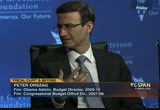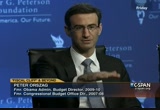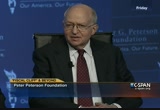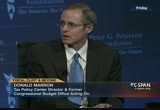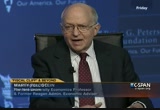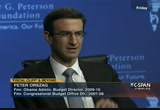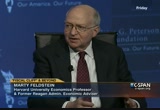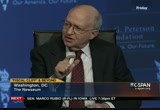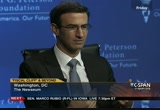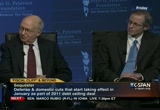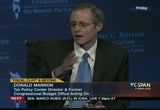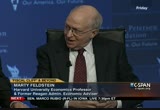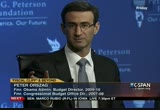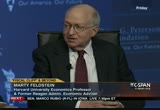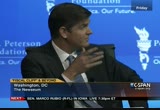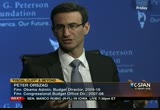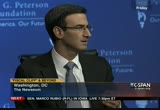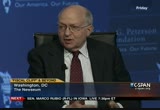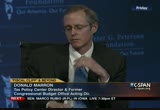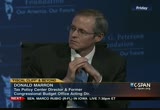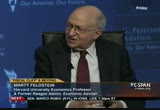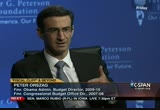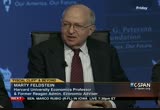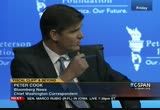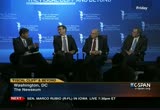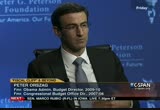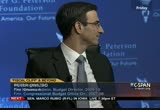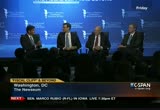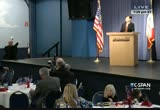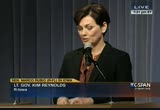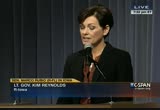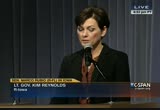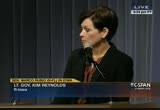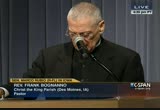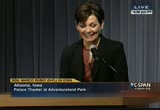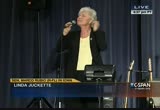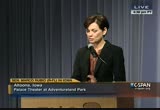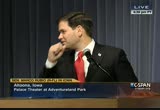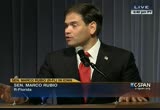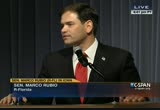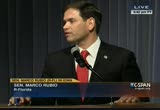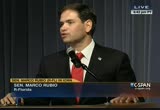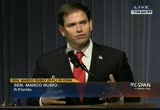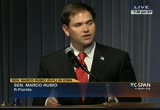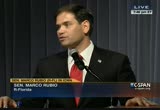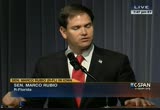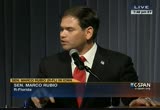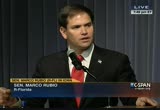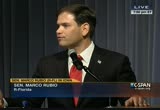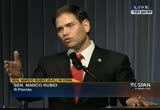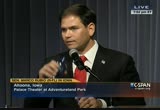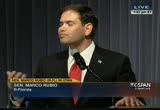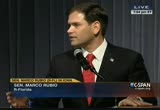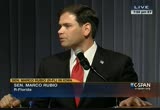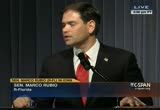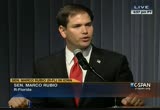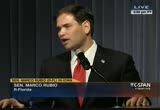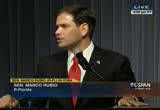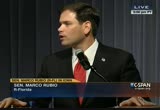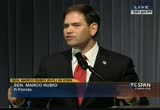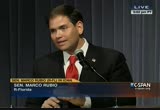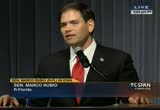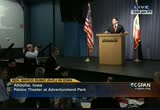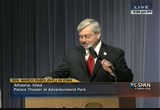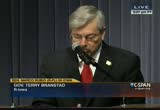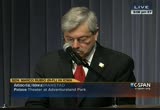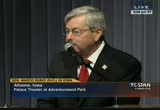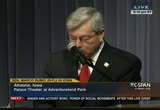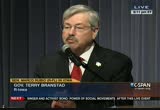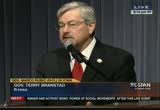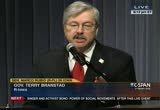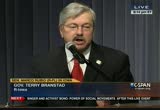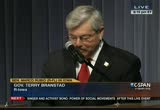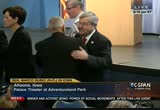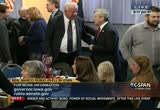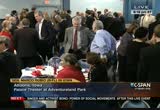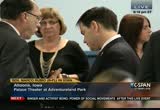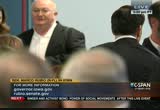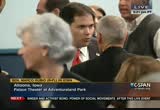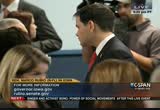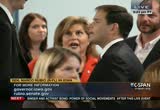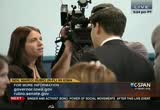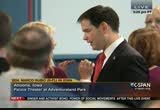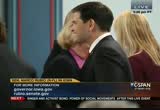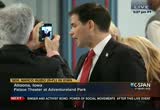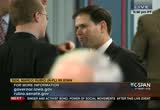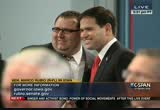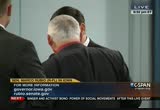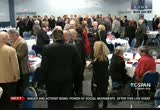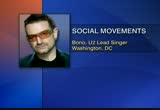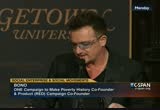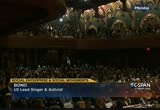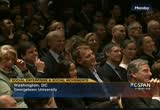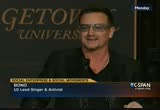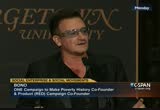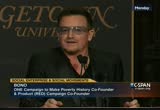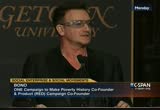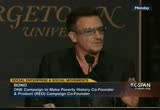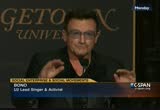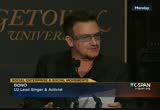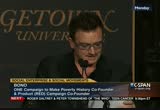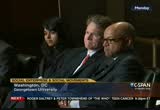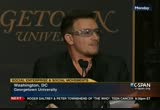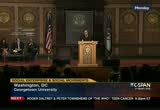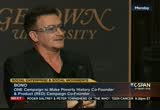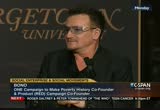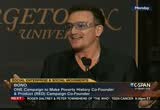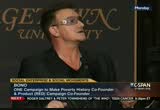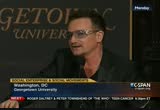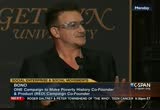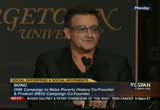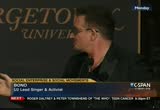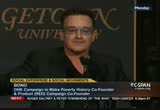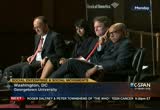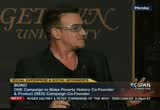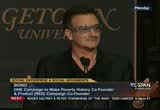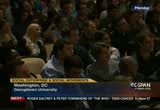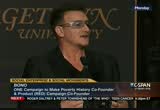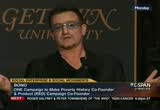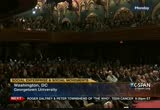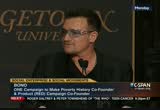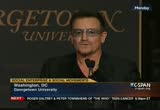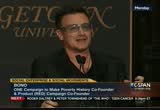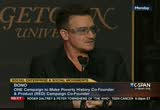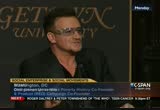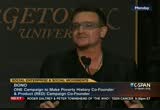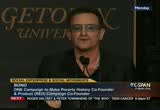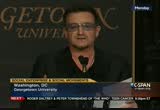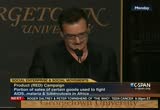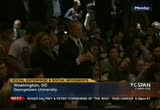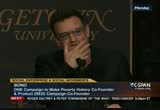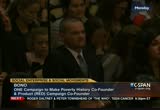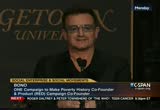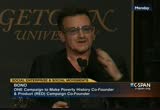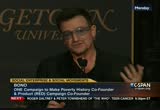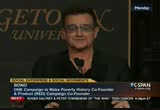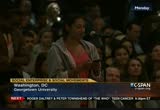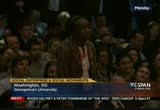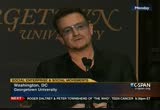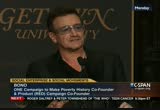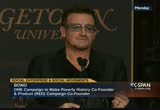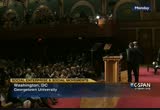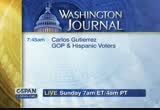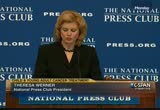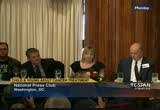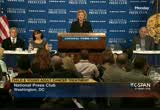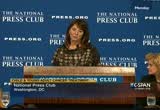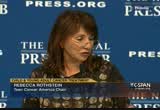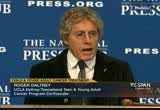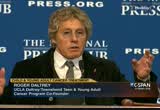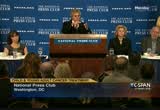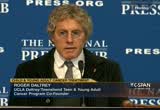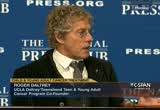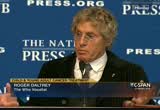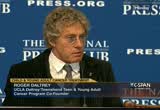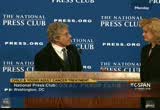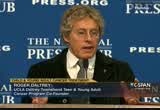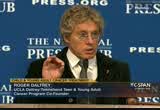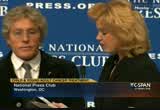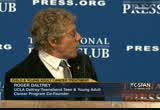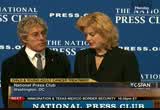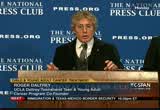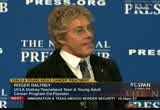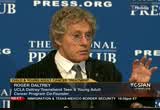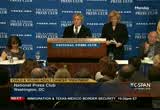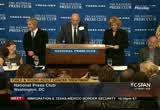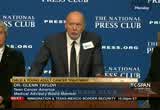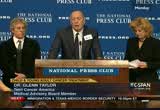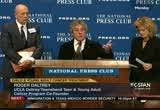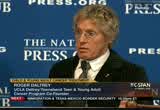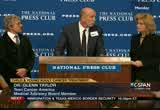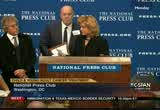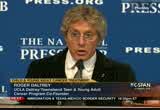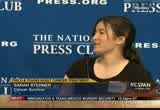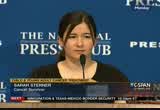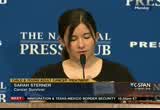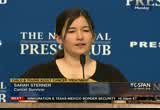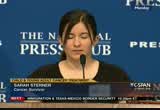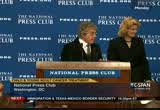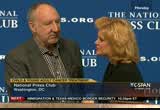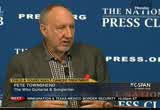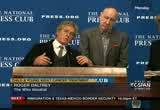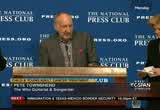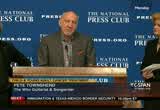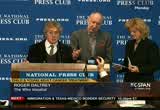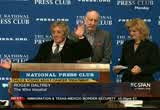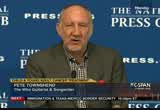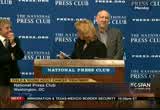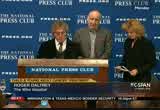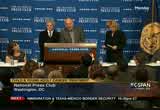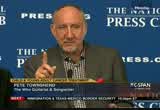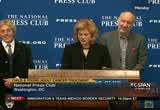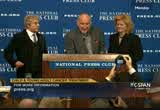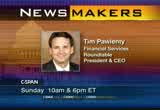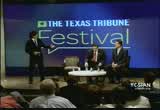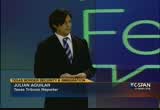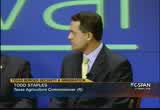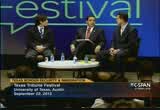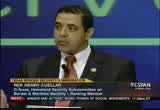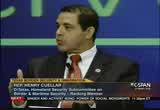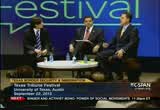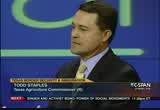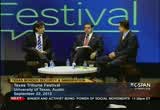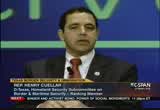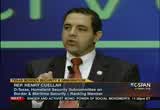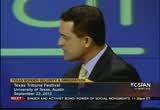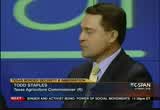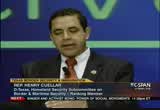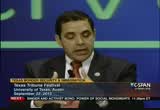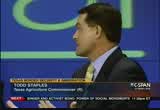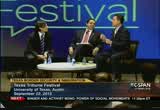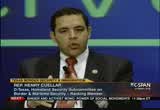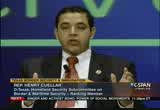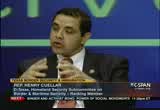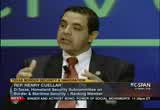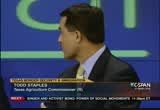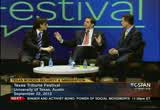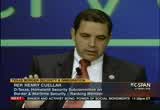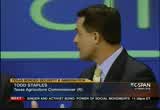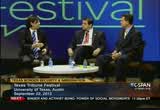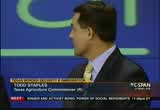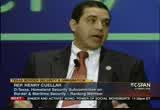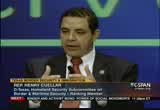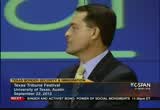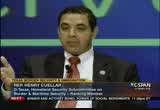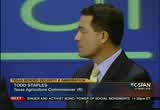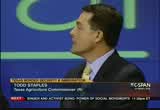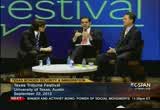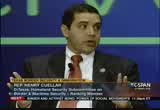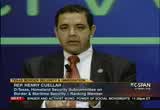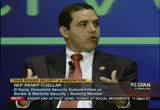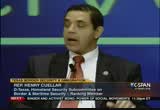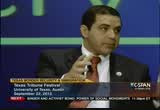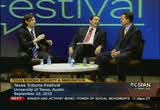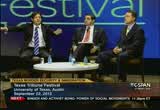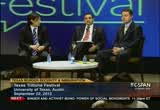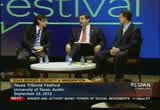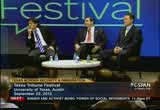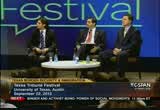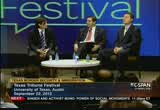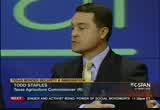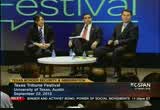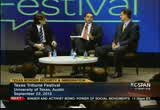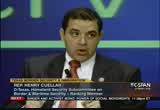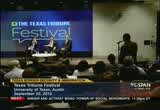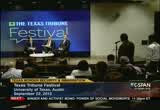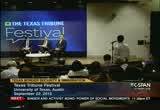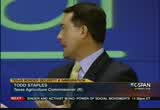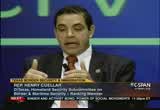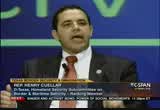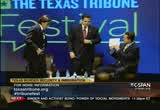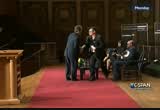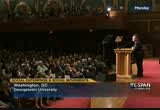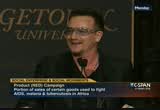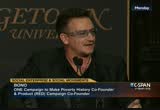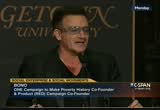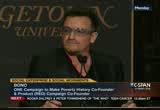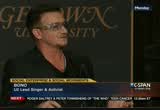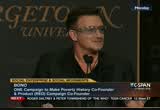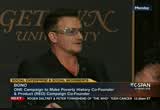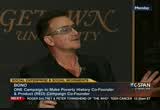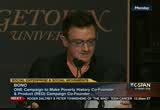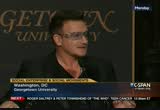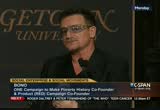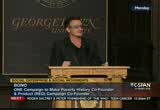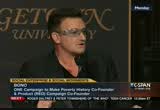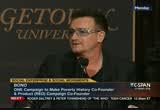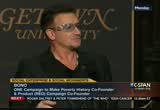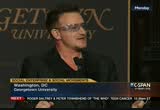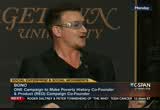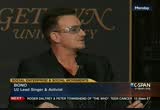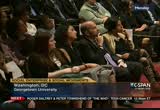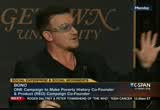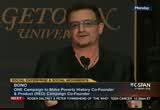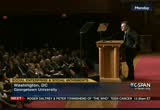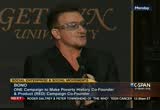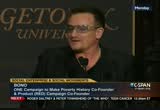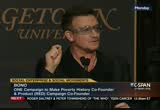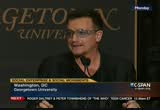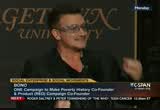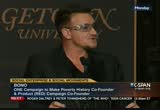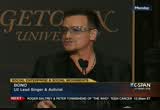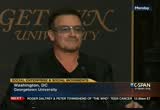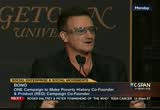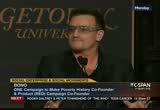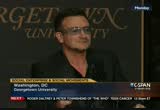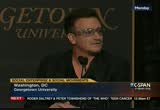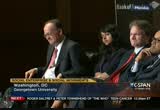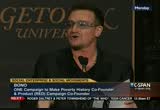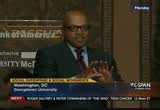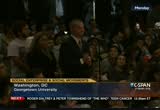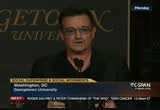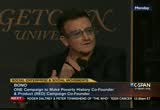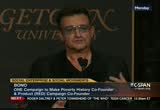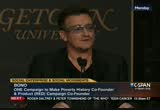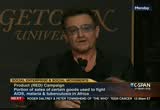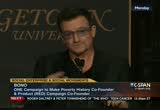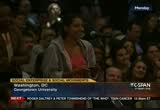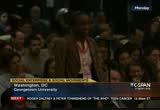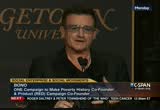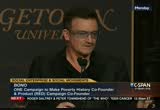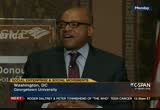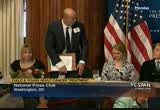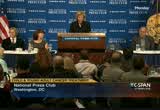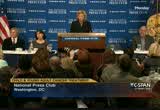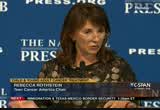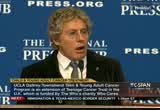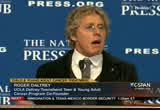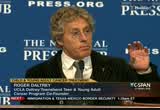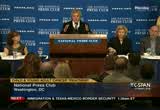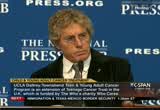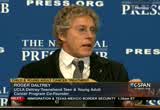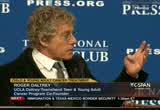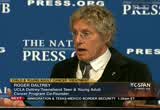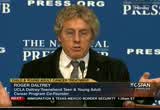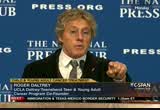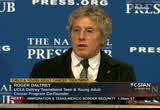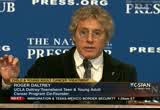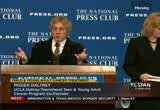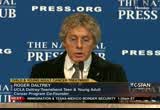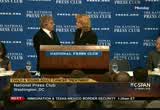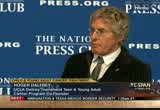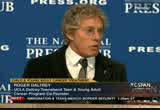tv Washington This Week CSPAN November 17, 2012 7:00pm-1:00am EST
7:00 pm
part of the solution, both because of the underlying budget math, but also because of the election that was on the substance, i guess the point i would make is that whatever comes out of the fiscal cliff arrangement, i will now step out of bounds of political feasibility because i no longer in office and say that the deal is very likely to lock in a revenue base i think is inadequate for 2020. it is important that we get to a deal and that it will include some revenue. i want to lay down a marker that the revenue base and we are likely to be locking into makes the budget master 2020 very challenging. both sides are relying disproportionately on unrealistic discretionary spending caps that in reality aren't going to work.
7:01 pm
the revenue base is inadequate and have no way of getting to the specific spending reductions to hit their deficit targets of the plug the hole by rationing down discretionary spending in a way that is not -- >> what is the appropriate revenue target? >> if you look at the 2020 horizon and try to do the math, i think we need about 2% of gdp in additional revenue compared to current policy. that would come if we just allow all of the tax cuts, not just those of up to it pretty thousand dollars in income to expire. not something we should do it immediately -- those of up to $250,000 in income to expire. not something we should do it immediately. >> beneath to -- we need to
7:02 pm
tackle entitlement as part of the package. when i get to the bidding cut out of the non-defense discretionary spending. in terms of the revenue, the key is broadening the tax base, bringing down the tax expenditures. there is a lot of revenue to be had in doing that. a plan that raised one put by% of gdp without higher tax rates is feasible. >> let me get you to weigh in on this, what should be the target if the country wants to get on a sustainable fiscal path. how much of the component should be tax revenue? >> become out on that the pence on your belize of what spending -- depends on your beliefs of
7:03 pm
what spending should be. in simpson bowles, both plants came out with revenue levels that are higher in the long run them what the president is proposing. they think a significant amount of revenue has to be on the table. one of the best ways to go after revenue is think about all the tax deductions, exclusions and what not. a lot of those of the moral equivalent of spending in the tax code. the ought to be in place. >> you have written about this significantly. both the president of mitt romney have talked about this kind of approach. let me ask you about that. can you get the revenue you need by capping those deductions without raising overall marginal tax rates? >> if you stay in today's tax rates and put an overall cap on
7:04 pm
tax expenditures, deductions, municipal-bond interest equal to 2% of each individual's adjusted gross income, that produces about $150 billion at next year's annual rate. over 10 years with the economy growing, that is about $2 trillion. you can raise a lot of revenue doing that. >> is what -- do you subscribe to those numbers? does that provide a middle ground solution here when the president says he wants to see higher tax rates. john vitter says axel in not. >> -- john boehner says clearly not. >> it is a lot easier to say at
7:05 pm
this level of generality. it becomes harder to enacted. the number of times of with the head of the cbo, senator so and so would call me up and say i want to talk about tax reform and i would walk in and the head is one talking point which is brought in the base and lower the rate. what are you willing to scale back? mortgage interest, cannot touch that. charitable, cannot touch that. you go down the list. one of the reasons of these new ideas being attractive is a are obscuring what has to be cut back. >> there is still a hard choice there. >> we are not saying we are going to cut out your ability to deduct your mortgage but i will get to keep my ability to deduct
7:06 pm
my local tax. everything goes into a pot. everybody gets to keep their deductions but you cannot be too greedy about it. it does have to limit the amount they can benefit from it. >> that is the selling point. >> the notion here, can you do this and have the only effect of the wealthiest americans -- affect the wealthiest americans? >> the numbers he was quoting would be to apply this to everybody. there is a lot of money for people below the targets. it seems like there's got a lot of willingness and enthusiasm in washington for respecting those folks. >> the 2% cap -- half of the money would come from people above $250,000, the other half would come from the rest of the population. it would produce about as much revenue from the top as going
7:07 pm
back to the pre-bush tax rates for that group. it will produce more revenue overall. it would cover the entire population. rex it would violate the president's pledge. -- > >> it would violate the president's plans. if you try to carve out a charitable contributions to mitigate the impact, the revenue number will start to fall substantially. my point is not that this is not a desirable thing to do although i think there are better ways of scaling back tax expenditures in moving towards credits. we are sort of at that moment. it is like that falls -- first moment in meetings with i would go to the hill and it was happy talk about tax reform. it gets harder at the two
7:08 pm
consequences become more apparent to the special interests. rex the president has repeatedly said high income people have to contribute to solving this problem. i do not think he has used the language only high-income people have to contribute on the revenue side. i do not think he has ruled out something which through based blogging would call for some contribution. >> the president will that out a dent in his budget he had this past year. >> that is right. but he has not in his current rhetoric. he does the said the problem should be solved just by high income taxpayers.
7:09 pm
>> let me ask about another component. capital gains and dividends. what about that side of it? the folks that what bloomberg and do a lot of investing are interested in what happens to capital gains. if you move it up to 20% or talk about higher figure, what would happen to investment in this country and how much money could degenerate? >> rates today are 50% for capital gains and dividends. it is already baked in the cake that is going to 18.8% for high- income taxpayers. they are often overlooked in this discussion but it is already a given. there has been a debate about whether to raise them further. i think your -- you're already seeing some evidence and.
7:10 pm
you will see a lot of timing gains in the short run. in the long run, we are in a range where raising taxes on capital gains has been attributed to additional revenue. it is something that is likely going to be part of the overall package for distributional and revenue. >> is it a substantial sum of revenue or more political revenue -- political rhetoric? say it moves to 23.8%. >> i forget the exact number. it is a chunk of money. the two of them together is definitely a significant component of what the president has proposed. >> in both cases, there is a strong behavioral response to changing the tax rate. you do not have to realize capital gains. there is a question of what you do to capital gains at death.
7:11 pm
right now, the tax liability goes away completely. higher rates will induce more people to hold onto a family business or a stock they bought at a low price. the state tax as well. these are all part of the mix. >> how to that factor in as bargaining chips? >> these are one of the reasons why it is challenging for this all to come together. i want to call out the final and he said. we do not have an amt patch for 2012 yet. an irs commissioner has said that without a deal by the end of the year that covers that for 2012, the irs will not be able to process tax refunds until early 2013 for the 2012 calendar
7:12 pm
year until perhaps mid march. that means a lot of american households who do their christmas shopping our holiday shopping in the expectation they will get a quick refund early in the next year will be caught out or not be doing as much shopping if they know this ahead of time. this is one manifestation of the consequences of not having a deal of the plays by the end of the year. >> the issue of taxing dividends and capital gains, the politics of that has changed dramatically over the last several decades. go back before president reagan came to washington. we had higher tax rates on the income from savings. economists have been arguing forever that that is the wrong way to go. that it discourages saving, it discourages investment. over time, those rates have come down. to a point where they are lower. i think it will be a mistake to
7:13 pm
go back in the direction of putting heavier burdens on savings and investment than we do today. >> we have not talked about the core rate at all. what about the notion of both sides agreed on lowering the corporate rate. that is just as heavy of a lift politically. >> exactly the same rhetoric and politics. you saw in the recent presidential campaign, one candidate running on a 28% rate, another running on a 25% rate. and did you try to begin out how to pay for it. politicians talk about rolling back loopholes but we look at them, they are fundamental tax policy decisions that have been made about manufacturing, the energy industry. all of which has constituencies behind them and are difficult to address.
7:14 pm
>> part of the president's answer to that is to not make the distinction between the corporate and the unincorporated business and raise taxes on what one of the speakers described as passed through entities. large partnerships. and that might have otherwise been corporations. >> i think there is no doubt that the corporate income tax in particular is a rickety structure in need of reform. coming about because we are in a world in which capital is increasingly mobile but we have this boundary around the corporate income tax in based on
7:15 pm
a national boundary and there is just tension contained in that phenomenon. there is dramatically different perspectives about where to move. the republican party seems much more interested in a territorial system where you get past on the profits that accrue in the united states. democrats are worried that creates even larger incentives for transfer pricing and for locating your profits overseas. and thereby escaping that tax. that is a fundamental divide. in addition, what marty was suggesting is also in play. a larger share of total activity has been occurring in non corporate settings, businesses that are not subject to the corporate income tax. that is where you also get into other related issues, including
7:16 pm
the carried interest debate. a lot of those funds are flowing through structures that are not corporations. that will be one of the subsidiary issues in play in this tax debate. >> you raise the corporate rate, if you lower the corporate rate to 28% and raise the personal rate to almost 40%, you create an incentive to go back to what people did before and figure out how to incorporate all their activities and get the lower rate. >> have you heard a good idea on the table? is that something that should even be pursued? i have heard republicans say they would be willing to go further on revenues if you can guarantee the small manufacturer down the street, it hit hard with a higher tax rate. >> you mean somebody who is already a corporation? >> somebody who is not a
7:17 pm
corporation. >> whatever rule there would be for forcing entities to become sea corporations, you would put aside a factory in. if you are less than so much in revenue a year, you are not required to do it. if you are very large, you may be forced to file as a c corporation. >> what are the pitfalls of that? >> it is always problematic when he have arbitrary threshold. the optimal way to deal with this is how the tax system be neutral across organizational structures. set up texas to collect enough revenue but not -- set up your taxes to collect enough revenue. the small business discussion
7:18 pm
is -- a lot of tax policy discussions have a low ratio content to rhetoric. the small business one is particularly bad on the ratio. >> separate fact from fiction for us. >> i am a small business. i did not feel like that makes me a small business guy. i have a day job. that data that you get are such that you read a lot of people like that who have a second home that they rent out. when you want to think about this for real, you have a district that out -- to strip that out. that is a real facts. most of the activity is multinational. degette active issues that a lot of the attention at that level is really about territoriality vs world wide taxation.
7:19 pm
>> the surprising thing about this territorial question about whether we should tax american companies in overseas profits when they bring back as if they had been earned in the united states but give them a credit for what they paid in taxes abroad, we are the only country that does that. the other major investor countries around the world also that what you earn abroad, if you want to bring it back into your country, you pay a small tax may be 5% are something like that. the argument that somehow that is going to lead jobs to go someplace else should be as relevant in those countries as it would be in the united states. 27 other oec countries have figured out how to live with that. i'd not know why they are so
7:20 pm
much smarter than we are that we cannot prevent that from happening. >> they say this will not be productive for the economy. >> there are a couple different opponents. apart from the employment dynamic, the larger concern is transfer pricing and artificially manipulating where the profits are occurring to escape taxation. >> why are we not better at catching more -- >> we have more [indiscernible ] states within the united states have faced this problem for a long time. the all have individual income- tax is. corporations can move across different datelines. each state is the equivalent of the problem that we are facing on a global basis. the way they have attempted to
7:21 pm
deal with that is to take the things that are the hardest to manipulate, to think like sales. it is much easier to manipulate breyer profits occurred in your sales. on a national basis, if x sales are in the u.s., x percent are taxed in the u.s., period. ten% of your global sales and to the united states are taxed. >> what is wrong with that idea? >> i would have to look at the arithmetic. what we are doing now is in the
7:22 pm
face of what every country does. it provides very strong -- american corporations probably have something close to $2 trillion abroad in funds that they do not want to bring back. they will instead find ways of buying companies abroad are opening new plants abroad because the penalty for bringing it back is often high. if our corporate income were down, the penalty would be less. we want to somehow get around that said they feel free to bring it back. >> what is your take on the issue and is there a windfall coming back to the united states? we have had a lot of business folks say we're going to put this money to use if you drop this and we can repatriate this
7:23 pm
money. >> temporary repatriation. the economic studies suggest and has little to no impact on observable economic outcomes. abbas just the evidence is it would not [indiscernible] the arguments are so much stronger. the world of change over the last two decades. as competition has grown abroad. and as our tax system has become increasingly out of whack. the structure of our system is different from -- for most of our competitors. there is a good argument you can make that be more like the norm of our major competitors would put us in a better competitive situation. rex i want to get your take on some ideas that have been put
7:24 pm
into the mix that are outside the box. given this is a full reassessment of the american tax code that we are told about to take place, the carbon tax. consumption tax. other ideas outside the box that you think should be part of the conversation. >> i think both a consumption tax and carbon tax have desirable features. it is just the air not likely to happen or the next 36 months. to start with a carbon tax in particular, unless you're going to completely denied the probability that we will face increasing risk from carbon emissions, pressing carbon strikes me as a step to get the behavioral change and the technological innovation we will need to adjust and adapt to what
7:25 pm
we have already done. a carbon tax also raises revenue in a way that could be used in different forms. it has an additional benefit associated with it. i am in favor of it. i do not think it is remotely plausible within the narrow political discussion we're having today. >> we start seeing gasoline prices coming down because the price of oil starts to fall because of all the activity producing in this country, maybe that will be an opportunity to increase the federal gasoline tax. with 50 cents a gallon federal tax. >> the only problem is from a climate perspective, transportation and gasoline is a small share of the problem. the problem is really in the energy sector. without a carbon tax, you're not
7:26 pm
directly getting at that. >> i think the carbon tax makes enormous sense to do with the environment impact of energy use. you can design one in a way that does not cause too much harm for american industries that compete with folks abroad. consumption tax, there are things you can do to treat the income tax to make it look more like a consumption tax. >> i want each of you to give me your thoughts at the end of the day, what do you think the tax code will look like with his conversations between the cop -- between the president speaker boehner are done? >> i think we will have slightly higher marginal tax rates on some high-income tax -- and these 1 high income tax payer. i think there will be a variety of tax exclusions and deductions that are scaled back modestly.
7:27 pm
>> if scaled-back means capped in some way, i agree completely. rex i think we will see some of those things will back. the top rate will be either 39.6 or 35. it will be somewhere in between. >> we have some common ground here among our economists. thank you, a gentleman for joining us. thank you all. i appreciate the peterson foundation for allowing me to participate. >> i remember in a low price when and at the university of chicago -- a noble peace winner at the university of chicago. he used to say if you have no alternative, you have no problem. i thought about the alternative of delivering what i am sure you
7:28 pm
would love to hear, a 30 minute lecture by me deliver charismatic lee, of course. or simply sanctity very much -- saying thank you very much. thank you and goodbye. [captioning performed by national captioning institute] [captions copyright national cable satellite corp. 2012] >> this is like in iowa were florida republican senator marco rubio will be the keynote speaker at a political fund- raiser for iowa republican governor brandstad. his annual birth and that is taking place in altoona.
7:29 pm
7:30 pm
>> if you take your seats, i think it will go ahead and get started. i want to say, good evening. this is an outstanding turnout. i believe we have not only set a record for dollars raised but we have set a record with -- it was sold out and the number of to attending. i think we have over 600 tonight. thank you so much. before we get started, i would like to recognize all of the elected officials here tonight, including congressman steve king. if you could ostensibly could give you a warm round of applause -- if you could all please stand so we could give you a warm round of applause. [applause]
7:31 pm
thank you so much for being here to celebrate the birthday of our governor and a dear friend of mine, governor brandstad. thank you for your support over the past two years and for your continued support over the next two years. our administration would not be as successful without you. and the space and the confidence and trust you have placed in us to get the job done. we are going to keep working diligently each and every day to continue to make iowa a great place to live, raise a family, grow and start a business. i would also like to give a special thank you to senator rubio for being with us this evening. i was honored to have the opportunity to serve as his secretary of the republican national convention and that is where i first had the
7:32 pm
opportunity to meet senator rubio. not only did i have the opportunity to hear him address the nation, but also the governor and i had the opportunity to sit down with him and get to know him and little better. you are all in for a real treat this evening. one of the pilot at the convention was i believe we showed america -- one of the highlights at the convention was we showed america that we are diversifying. we have great enthusiasm, visionary people on our team like susanna martinez, governor haley and senator rubio. i know we just came through a very tough election but i am extremely optimistic about our feature. we are just about two years in office and i am proud of the progress we have made. i know we still have a lot of work to do. we have had tremendous capital investment in our state.
7:33 pm
google just announced another $200 million investment yesterday. we have restored stability back into state government in iowa has a robust and diverse work force. with over 500138 attendees iowa is on the move with fresh and new faces. we remain committed to providing a business climate that fosters new business, and addition in gives our loyal business is the stability they need to grow and expand. iowa's economy cannot be where
7:34 pm
it is today without the tough choices and leadership of governor brandstad. havepw many of you here heard me say that governor brandstad was the right person to the right time to turn this state around and bring back growth and opportunity. governor, thank you for being a champion of economic development. for putting iowa families first. we have benefited from your leadership, integrity, experience, work ethic and discipline. thank you, governor and chris the your commitment and devotion to the people of this state. [applause] it truly is an honor for me to work with you each day and serve the citizens of iowa. governor, happy birthday. now i would like to invite the
7:35 pm
opening prayer. >> thank you. let us take a moment to pray. lord, we stand and sit in gratitude for this evening of celebration of the second annual 65th birthday of our beloved governor brandstad. thank you for his love, and love that comes from you. a love that motivated him to seek this office. and love that he holds in his heart for each iowan and for iowa. thank you for his lending us his talents and his ability, his time, his experience, his knowledge, his skills, his
7:36 pm
values, his vision. thank you, lord, for his leadership, leaving us -- brighterding us to a future. to raise our families with high moral values. bless him on this evening of celebration. help him with the three pillars of leadership -- perseverance, courage, and wisdom. help us to support and to encourage him, to help temper severe along the right path of justice and compassion to replace him this evening. bless his family, his staff -- and compassion. bless him this evening. unless his family, his staff. we ask you for your grace and and mercy. amen.
7:38 pm
7:39 pm
house of representatives from 2000-2008 and was elected to the u.s. senate in 2012. he serves on commerce, science and transportation, foreign relations, intelligence, at small business and entrepreneurship committees. senator rubio has the courage and tenacity to stand up to washington's reckless spending and assault on the free enterprise system he is the type of an elected official we need to restore fiscal discipline and champion job creation. american can expect great things from this man in the years to come. ladies and gentlemen, please give a warm iowa welcome to senator marco rubio. >> thank you.
7:40 pm
thank you very much. i am honored to be here today. i want to taint -- thank all of you for inviting me. i'm still new enough in politics to be amazed that people so far from florida even care what i have to say. i was here in this part of the country earlier in my life. i came to a small school in northwest missouri that is no longer around. it is not my fault. [laughter] akin. maybe someone is not happy the college is not around. people ask all the time when -- why did you go there? it was the only school in america that would allow me to play football.
7:41 pm
i would have been in the nfl had it not been for my lack of size, speed, and talent. i'm glad to be here for the second anniversary of your 65th birthday. address right up front of the elephant in the room. anytime anyone makes a trip to iowa, people start speculating about what you will do in the future. let me be blunt, i am not now nor will i ever be a candidate for office coordinator of iowa. [applause] i know there are rumors. i've heard a lot of people that are discouraged. i have the honor traveling this country on behalf of governor
7:42 pm
mitt romney 2 i can tell you for those who have not met him, is an extraordinary person. i believe he would have been a phenomenal president. we wish him all the best and hope his voice states involved in the american political process. [applause] we're having this conversation now for those who believe that the limited government conservatism -- who believe in limited government conservatism. this is not about the republican party. this is about limited government conservatism. the republican party is the home of that movement. limited government conservatism has never been decided by presidential elections. for you can find the true meaning of limited government that separatism is in states like this preferred governors like yours are applying tried and true principles to the
7:43 pm
modern problems of the tunney predict what the first century. if america had a thought from 1% on plummer rate, we would all be very happy, as you should be with the governor and the work to your littleneck governor and legislature are doing here. you deserve to be congratulated for that. [applause] for those of us in federal office, the question is how to apply the principles of limited government conservatism and free enterprise to the problems of the 21st century? that is what we need to be focused on now and living for. let's define what the problem is. the problem we're facing as a country -- i gather this from traveling in a lot over the last six months and talking to a lot of people across this country. i gather this from talking to a lot of people in florida. you can pick up a lot of good insight in the checkout line at a grocery store, pick your kids
7:44 pm
up from school and traveling the country as i have had the opportunity to do. here is a problem i have seen -- our economy has stagnated, particularly the middle class. today workers are not making as much as it once made in john -- in jobs 10, 15, 20 years ago. my father was a bartender, my mother a maid at hotels. they were able to provide for us in standard of living, not rich by any means. we only had everything we needed. my parents were able to provide as the standard of living with those jobs. it is very difficult to do that nowadays. the fact is our middle-class has stopped growing. wages in the middle class have stopped growing as well. private health insurance is harder to find. today 45 million americans have no health insurance coverage. health care costs are taking a bigger bite out of their monthly paycheck.
7:45 pm
this issue of our middle class been under assault in appealing threatened, this is not just an economic problem. this is a problem that goes to the core of what america is. here is what i mean by that. every country in the world has rich people. unfortunately, every country in the world has poor people. one of the things that mid- america exceptional is a vibrant middle class that anyone could aspire to be a part of, no matter where you started out in life or where you came from or the circumstances of their birth. the great promise of america is that everyone would have the opportunity at the work hard, played by the rules, to go as far as their talent and work ethic would take them. this goes to the core of who we are at the people and the nation. it is one of the few things that sets us apart from the rest of the world. when we talk about the middle class in america, we are talking about the essence of who we are as a nation. before you can solve any problem, you have to know what the problems are. there are two main causes of
7:46 pm
what is happening today to middle-class americans. our economy is not growing fast enough. it is not creating middle-class jobs, the jobs that people enough money so they can have the kind of life and give their kids the kind of opportunities my parents gave me and your parents gave you. the second problem is too many of our people do not have the skills to take advantage of the jobs that are being created. i have not had a chance to talk to the governor about this, but i have heard from others in the state that this is a state with low unemployment and where jobs are being created. a struggle sometimes to fill some positions because people do not have the skills to do the jobs that are being created that the pay middle-class type waited. globalization is real. it has changed the way the economy functions. it has moved jobs overseas that were once here. the other reality is automation israel. my wife, when we were still dating -- automation is real.
7:47 pm
my wife, but we were still diggiating, was a banker. now you can take a picture of your check and deposit it. the political leadership that understands yoa government that spends more money than they take in will run into trouble fast. if the tax rates are too high, it discourages people from investing. they are unpredictable -- unpredictable, it scares them away. you want your water to be drinkable, your air to be breathable. you what will the people have to follow. if you are not weigh the cost of the regulation with the impact positive or negative it will have, you will have that regulations. we do not have any of that.
7:48 pm
government is contributing to this climate of poor growth. you look at the fiscal cliff. you know who made that? congress made that. the idea that each have an enormous tax increases at the same time we have a dramatic cuts in spending, that is the same time all these tax breaks expire and the spending goes down. that was not an accident. congress chose that. this fiscal cliff is a complete creation of the political branches. it is an example of a dysfunctional process that threatened our economy and its people across our economy. what about the uncertainty out there and what regulations are going to be? about energy policy, the national debt. we owe $16 trillion. all that discourages people from
7:49 pm
investing their money in america. that is how the economy grows. but some of u.s. access to money decide to take it out of the bank and puts it into business. the second part of the problem is our people sometimes do not have the skills they need. it all begins with societal breakdown. we have very significant societal problems in america. a breakdown of the american family has a direct impact on our economic well-being. i often hear people talk about social conservative and fiscal conservative. the social and moral well-being of your people is directly linked to their economic well- being. the fact is it is startling to
7:50 pm
see what an enormous advantage at life is when a child is raised in a stable home by two parents. it is the greatest gift might ever gave me. not a big house, not even a college savings account predict could not afford that they gave me the back label thing -- they gave me a valuable ting. hing. my parents loved each other and live together and raised us and make us feel loved and the courage to dream. there are a lot of kids who did not find themselves in that circumstances. there are -- heroic single- parent out there but it extends beyond that. millions of kids are growing up a dented dangerous -- in dangerous housing.
7:51 pm
these kids are starting out life with five strikes against them. it will be difficult for them to get ahead unless someone does something they manifest themselves in our economy. we need to understand that. there are other issues. we needed 21st century curriculum. we have to educate our kids to have the skills to do the jobs of the 21st century. we need to do a better job at adult education. there are plenty of people in the late 20's or early 30's. maybe they did not go to school without the regret it, to change their lives. we have to pick her out how to get them back into programs so they can -- we have to figure out how to get them back into program said they can train. she was able to go back to school and get her degree and a master's a that a special education and changed her life completely. we have to do that for more people. college costs are significant.
7:52 pm
what is going to school -- after going to school, i graduated with exorbitant student debt. someone called sallie mae kept ticking hundreds of dollars out of my account every month. some months, when you added up my student loans, i spent more than on any other expense. behalf to do something about that as well. to many kids are graduated with an enormous debt load. -- we have to do something about that as well. too many kids are graduating with an enormous debt load. let me tell you where we start. we start with a simple notion. the way to turn our economy around is not by making rich people poor. it is by making poor people richer. that is the way to move our country forward.
7:53 pm
[applause] what can government do at the federal level to get the economy growing again? look to your governor here in iowa. how about balancing your budget and deal with debt? [applause] how about tax rates that generate the government -- the rates government meets but not so high that people are afraid to invest in economy? a regulatory process that takes into account the cost of the regulation? an investment and then the energy policy, not just energy politics. united states is now the most energy rich country in the world with a wide portfolio of energy resources. that is not as good in terms of fitting jobs -- of creating jobs
7:54 pm
or because it allows us to be independent. it allows american manufacturing to be competitive again. labor costs were lower overseas. we can lower energy costs, of a sudden all kinds of american manufacturing is viable again. manufacturing jobs are middle- class jobs not allow people to raise their families, to buy a house, take a vacation and send their kids to college or get ahead in life. if we had a viable energy policy, we would be so much further ahead. we have to deal with health care. the government's solution is not the answer. we need to figure out how to empower people to access to a vibrant private market where they can buy the insurance they need at a price they can afford from any company in america that will sell it to them. the federal policies that encourage reform. we need sound monetary policy. the federal reserve, its role
7:55 pm
should be testable car and say -- should be to have a stable currency. there are millions around the world emerging into the middle class. they buy more stuff, including food. many of the country they live at the cannot produce the food they want to consume. that is where we come in. american manufacturing has the opportunity for an extraordinary 21st century renaissance. iowa is a state that understands that. how about free but fair trade? more markets to buy the stuff we build. there are millions out there that can afford to buy it now. i think we need it -- to modernize our legal immigration system. 1 million people a year immigrate here legally. no other country comes close to
7:56 pm
that figure. but the system needs to modernize. need to take into account the opportunities increase for investors are jobs. the visa process first for the need to be improved as well. south-- the visa process needs to be improved as well. we have the opportunity for business exchange. there are other things government can do a parody are being pioneered at the state level. the second part of it we have to do is prepare our people. that starts with the family structure. we have to be clear with people that there are consequences to societal breakdown is. our government cannot do anything to undermine those institutions that have always been the ones that help strengthen our families. we must do everything to ensure this federal policy does not allow that to happen. we needed 21st century education
7:57 pm
system. i believe in early talk of education. a curriculum that teaches the kids what they need to learn and succeed in the 21st century. your lieutenant governor is a leader and education. we need more of that. we are preparing our kids to compete with kids in mississippi and alabama when they are actually competing with kids in china and india. we must bring our standards up. i talked about career education. more heavy stigmatized of vocational education? there are -- why haev we stigmatized of vocational education. there are kids who do not want to go to harvard. this should be in industries certification in a career like that. all these things matter. i will conclude by saying this
7:58 pm
frustration out there is real. from some people on my son of the aisle -- so many people on my side of the aisle, i have heard people say things i will mica in baltimore. i will focus on my family and community and the politics to others. others have suggested the american electorate has changed. i cannot believe that is true. i cannot believe that is true. if it is true, the very nature of our country has changed forever. that cannot happen. i cannot believe that is true. i the most are like my parents. all the what is a job that pays them enough money so they can buy a house, take their kids on a trip every once in awhile, do something they enjoyed in life, and leave their kids better off than themselves. the problem is those jobs are not being created as fast as they once were.
7:59 pm
to many of them did not have the skills to do the jobs that are being created. that is what they want. i think that is who we still or as a people. i do not think that has changed. i think what has happened is that there are those that have made promises to them who i told them we have more government, a bigger program that does this. if you allow us to tax one people more to pay for services for another group of people, convincing people that is the solution to the problem predict government does not heard the people. it hurts them. big government crushes the people try to get ahead. people love made it, the millionaires in the big corporations, there is nothing wrong with those folks but they can afford to do with big government. they can hire the best lawyers in america, the best accountants. they do not like the law, they can hire the best lobbyists to
8:00 pm
change the law. let me tell you cannot deal with it. the small business owner. big government crushed as people try to make it. and that is what to out the 6000 years of recorded history, almost everyone who has lived has been poor. 6000 years of recorded history, almost every person who has ever lived has been poor and disenfranchised. we americans, this is the exception and not the rule. even in many parts of the world, what we have is rare. that is important. if america declined, there is nothing to take its place. there is no other country, no other organization, there is nothing that is what we are. there is no other country to stand there.
8:01 pm
what country will serve as inspiration to people who have been told all over the world -- we express our opinions. people can look to america and see someone just like them who has accomplished extraordinary things. if america declines, if the power of our example dims, what takes its place? the answer is nothing takes its place. your children and grandchildren will inherit a demand this country and a diminished world -- a diminished country and a diminished world. darker and violent than has been in a long time. what is at stake is not just our country, but the way life is on our country. -- but we like is on our planet.
8:02 pm
we need to convince fellow americans who perhaps did not see things the way we do that for enterprise is the best way forward for them. the government and limited and enterprise is economic system that has allowed a vibrant life for the middle class to take root. that is not a hard argument for us to me. we need to make it. if we do, you will see all across this country what you are seeing here -- the ideas that made as an exceptional nation will continue. our children will inherit what they deserve to inherit, the single greatest nation in the history of all mankind. i am grateful you gave me an opportunity to share this with you today. i have had no other chance other than to speak in my home after the elections. even that has been limited. [laughter]
8:03 pm
but i am grateful you give me the opportunity to address you on these topics. what is at stake is truly generational. i see this as an extraordinary opportunity for us to do our part and right are pages in the extraordinary history that is taking place. oftentimes people come up to me and say thank you for what you're doing for your country. i feel guilty because i can never do for this country what it has done for me. i do not know what my parents and i would have done and we have not come to this country in 1956. perhaps i would be like how people have been throughout the years of history. i would be doing what my father did. under is nothing wrong with being a bartender at a banquet. but he did that so i could have
8:04 pm
the career that i have. there are many others to have that dream for their children and grandchildren. our job is to make sure that they can do that. there is an example of what government -- government can do. i pray god will give me the opportunity to do that in washington, d.c. thank you for speaking to you on these topics. [applause] thank you. thank you. thank you. let me just say i am i am relieved there were no hecklers. we are here to celebrate the
8:05 pm
8:06 pm
8:07 pm
[applause] we are expecting our fifth granddaughter in december. a month away. aren't they great? thank you, girls. [applause] i want to thank all of you for coming here tonight. i want to thank bridgette, mackenzie, and the lexus for leading that birthday song. you girls are great. -- and alexis for leading that birthday song. you girls are great. i am proud of you. [applause] i want to thank my entire family and my two sons and daughters and their spouses and extended family, all the people who have been a wonderful
8:08 pm
support system to me. i also want to thank another special family who own adventure land. this is the greatest example of a family-owned business that provides wonderful recreational opportunities for people of iowa and thousands of visitors who come here. i have a nostalgic feeling every time i come back to adventure land. we had my first birthday party -- first 39th report a party here. i love coming back to a denture land. this is a special place. -- i love coming back to adventureland. this is a special place. great example of a successful story. thank you for your generosity.
8:09 pm
[applause] obviously i am proud that we could have this event at adventureland. i know how important this part is for tourism and the benefits it provides to our economy. i want to thank the cochairs of this event. they did a fantastic job. thank you very much for making this such a great success. thank you. [applause] i also want to acknowledge the steering committee -- janet, mark, jennifer, chuck, brenda, joe, debbie, doug, aaron, jane,
8:10 pm
marsha, dan -- i want to thank all of them for their good work. thank you for making this the most successful fundraiser we have ever had in history. thank you. [applause] i want to thank the band for their great entertainment and lindsay of live, love, bake for delicious birthday treat tonight. wonderful cake that the put together. thank you. [applause] one of the big reasons for having such a great success is our inspirational speaker, marco
8:11 pm
rubio. what a wonderful message he had. what a great example of the american dream. he is an inspiration to me and many others to continue to focus on a limited government and empowering the private sector to grow opportunities for all of our peoples. -- we havevent turned a page and looked toward the future. you never fight the last battle are look at the last campaign. you look at the future and you learn from the mistakes of the past and of better job in the future. marco rubio is the kind of inspirational leader that will help us point us in the right direction. salut! [applause]
8:12 pm
we're very honored to a been selected by the people of ireland two years ago to lead this great state. -- iowa two years ago to lead this great state. we had a lot of onetime money used for ongoing expenses. we had a projected deficit in the hundreds of thousands of dollars -- actually millions of dollars. we had a lot of challenges. we focused on bringing quality jobs to our state. reducing that tax burdens and making iowa more competitive. we are proud to work on this every day. it is great to lead a state like this for you have ambitious and
8:13 pm
hard-working people and a population that gets diverse every year. we seek to make sure that each person has an opportunity to achieve the american dream. we do that by getting government out of the way and giving the business community the opportunity to grow and realize their dream and individual iowa worker to get the education they need so they have the skills for the jobs of the future. [applause] we want those new startup businesses to succeed and grow in our state. you want to make sure that all take ownership of their own health and work together with us to reduce the costs and accessibility for
8:14 pm
health care. we will provide the best educational opportunities for our children. i'm excited for the future. you have heard about some of the things that have happened recently, but we have just begun. if we continue to reduce things like the commercial and industrial property tax and make it more competitive, we will have more startup businesses and growth in the future. [applause] we are not satisfied with this unemployment. we want to be where north dakota is at 2.7%. [applause] e. have agricultura i had a good conversation with the governor of north dakota. he shares our faith and
8:15 pm
philosophy about the way we grow our economy and make our state more competitive. i want everyone to know how much i appreciate your personal support and the financial sacrifice you have made to give me this great honor of serving you. i promise i will work each and every day to continue to garner support and confidence. i will make this state the best it can be. iowa is a great state with a lot of wonderful people. our future can be even brighter because of what you are doing. i am honored and proud to be part of this wonderful team we have been able to put together to lead this state. with that, i will end by saying thank you. god bless you. enjoy the music.
8:16 pm
8:34 pm
>> coming up tonight, singer and talks about the power of social enterprise and social movements. after that, roger daltry and pete townshend. >> this man got into politics after having killed many businesses as a young man. the only way to get into politics was to be part of a machine. there were two machines. he took up with one machine, which was the most corrupt and dishes machine. ious machine.
8:35 pm
how could you work with this machine in local politics? second, how did he come to an atomic bomb? what was behind the decision? what is the story about the atomic bomb before he became president and when the decision was on his desk? it is still a controversial story. i wanted to know more about it. >> from his early life to his presidency, aida donald talks about her book. this sunday on "q&a." >> bono urged u.s. politics not
8:36 pm
to cut foreign aid for such programs. he also answered questions from the audience. this is about an hour. [cheers and applause] >> thank you. thank you, brian. very special man. the band also wanted to say thank you to you. they are committed to the idea that every child has access to free music lessons if they need them. brian has been helping us out with that, along with the american ireland fund.
8:37 pm
thank you to juliet 2 has made me feel welcome here. and also to j.t. who is learning a song instead of doing his homework. [laughter] [applause] look at that, that is the spirit that will change the world. i can feel it in this room. what a room, by the way. us has played -- u2 has played some nice halls. i feel oddly comfortable. a bit of a worry, isn't it?
8:38 pm
[laughter] welcome to pop culture studies 1 01. -- 101. today we will be learning why musician should never be given the microphone at institutes. you will receive no credit for taking this class. [laughter] i will be dropping, references to give the impression that i know regeneration is at. i do not know. i do not know where i am not. the first existential question in this class might be -- what am i doing here in this hall? i could be having my third pint . [cheers and applause] pop culture references, i heard
8:39 pm
on election night i was quite messy on the pint front. 3 or 4t how funny how pints you know you can taste the defeat. congratulations are in order not as for turning out in record numbers, but for electing an extraordinary man for president. [cheers and applause] but also, you are finally free from the tyranny of negative advertising. from both sides. could you bear any more of it by the end? can imagine what it would be like if we did this for everything all the time?
8:40 pm
rival smart phone companies and college admissions? hello. where georgetown and we approve this message. let me say a few words about some of the schools you might be considering. uva, thomas jefferson, what have they done to you? syracuse, a school whose mascot is a fruit. [laughter] duke, a school that worships the double. -- devil. georgetown, you're in with the other guy. everyone knows i got is a catholic, right? two words -- that proves it.
8:41 pm
[laughter] i have been hanging out with politicians. i really do not understand politics in the ad forum. i like to hear attack ads on those worth attacking. i would like to hear an attack ad on malaria and hiv ads. choose your enemies carefully because they define you. so'll spend a lot of time, pick a worthwhile and me, shall we? i would suggest to you extreme poverty is so extreme.
8:42 pm
it lasts up the concept of equality. it out how far we have traveled in our journey of equality. it is a journey that took place with slavery and it will not end until misery is in the stocks. social movements have always been powerful, but the subject of my speech tonight is going to point out what is a chance for native element about this moment and this generation of -- transformative element about this moment and this generation. wouldn't that a helluva way to start the 21st century? the history department might disagree with me.
8:43 pm
i do not believe that the 20 per century start in the year 2000 of january 1. for a lot i believe it began in 2011 with the people of the arabs spring. what happened is the pyramid, the traditional model of power got inverted. people at the top got up ended and the base had its say. the arabs bring it is ongoing. -- arab spring is ongoing. what i am talking about is bigger than egypt. it is a massive shift that in 100 years, the historians will write about this phenomenon in the history books. the base of the pyramid, it is taking more control. the institutions that have always governed our lives -- st.
8:44 pm
are being bypassed and weekend and sears detested. people are holding them to account. they demand that day are more effective or else. in the u. s, we have the tea party and occupied do the same to the bankers of wall street. social movements are competing. we have to hope that the more enlightened will win the day. we have to help the more of my mental and the day. we are 3.2 million people at last count. we are asking the world to pay attention to the least among us. there are many things we can do to help them. we will see things are happening in the developing world.
8:45 pm
think about this particular moment. not just facebook in the heat of the square but the peaceful march across the world mobile phone. across the parched land of the dense rain forests of the congo. technology is transforming things. everything is speeding up. everything is opening up. if i can talk about something i actually know about for a moment, this reminds me of the arrival of punk rock in the mid- 70's. the clash was the very base of the rock-and-roll pyramid. overnight they gave the finger to be dreadful business that was at the top of the pyramid. it was called progressive rock. great reviews. epic songs, no good lyrics. great reviews.
8:46 pm
but the band made no pretense of being better than the audience appeared they were the audience. virtuosity was out. the clash were like a public- service announcement with guitars. they gave u2 the idea that social activism could make for a good social right. i would like to point out none of your professors as ever draw the connection between the arab spring and the clash. [applause] [laughter] little intermission. ok. sharpen your pencils. i do not need to lecture you about change of the air you
8:47 pm
breathe. you are in it. i think change is your expectation. what might mean for you when the pyramid and the whole lot else gets turned on its head? what a huge opportunity that affords you if you are willing to seize it. there is not just one lever up power anymore. you have a lot of them in your hands. will we press them together at the same time, that is when things really start happening. let me hit the brakes before some of you do. let it the knowledge that it is brutal out there. it is brutal out there.
8:48 pm
by there i mean here in america. the economy is still in a rough shape. this sounds you hear is a big pair of scissors bearing down on the safety net cuts, foreign aid cuts and all these cuts coming in for a drive over this fiscal cliff. cuts hurt. somebody believes. the aid cut alone would mean that two injured 75,000 people will not get the -- 275, 000 people will not get the treatment they need resulting in 65,000 deaths. broke people. real bleeding. that is why you will hear us making the campaign that cuts should not cost lives. it should not be a hard case to make but it is right now in hall of congress, the senate. maybe even here.
8:49 pm
i put it to you. we must not let this economic recession become a moral recession. that would be double cruelty. [applause] you know, it is not just take away your chances here at home. it might therefore take away your generations shot at the greatness in the wider world. the generation before you outlawed the idea of the color of your skin deciding whether you could vote. it challenge that your sex could decide your future. this generation has the chance to challenge the absurdities of where you give deciding whether you live. [applause]
8:50 pm
the most vivid example of this for me was a clinic in rwanda and in 2003. there were far too skinny men and women. long lines of men and women courageous enough to take hiv/aids test, the nurse is not a diagnosis was a death sentence. -- knowing a diagnosis was a death sentence. there were no other clinics in rwanda. looking into the eyes of hopelessness i was surprised to find no anger, no rage. just a strange acquiescence not from the versus. the nurses knew that this was not a killer disease in europe
8:51 pm
or america. they had a very different look in their eyes. fast forward five years. the same clinic, a whole different scenario. nurses beaming with the job satisfaction. these debt accounts have become a bird counts, maternal clinics. not just in the city but the whole country. they understood the united states have deep respect for their lives. this is not the old paternalism. this was partnership. without partnership rwanda would not have managed to get life-saving drugs to 91% of the people who needed them. good leadership. there are problems in rwanda with the leadership.
8:52 pm
on this comment they got the strokes provided by the united states. it is a blooming story. we are moved by such moving events. i am probably here because such events. ours is not a soft oakland's. we try to keep our of - -lens. we try to keep our honor code. can you believe the dryness of the term, evident based, excellence. -- activist. yours truly. i am here to tell you that your heart is not the most important thing. your heart is not going to solve these problems. if your car does not find the -- heart doesn't find the right in your head we're not going to get away. it is not charity that fires us. it is justice. that is what inflames us. justice is a higher standards. people are looking for clean and simple melody lines.
8:53 pm
just a dollar and you can save a life. just an hour. bollix. it is not true. it is crap. if you want to turn the world right side up, it is not what to take a minute or an hour a day. it is going to take your whole life. i am going to make a bid for that. that was the brakes. now for the gas. for me where it all started where humanity started. where are humanity is needed now, africa. you should ask why would you be listening to me talking about africa?
8:54 pm
this backup has been an extraordinary and the venture to me and privilege. wild, magnificent, magical, sometimes maddening. it is extraordinary. i realized i have been working for nelson mandela and archbishop desmond tutu for most of my life. from anti-apartheid to the fight for human rights. the right to live like a human. nelson mandela and archbishop tutu, there is no way to turn them down. particularly to two. he called in the big guns. on the rare occasion i have tried to turn him down, he is told me that he will personally see to it that i will not get into heaven. [laughter] i think he might have that kind
8:55 pm
of pull. [laughter] even if that were not for them, i think i would have felt people to africa. ireland, maybe? ireland has a very living memory of famine. i am coming out from under colonialization. we are all interested in the future and what the world will look like for the kids. people say china is the future. if you ask the chinese, and they are all headed to africa. the largest diaspora of recent times is from china to africa. by 20,015 it will be twice the lation5, africa's populcatio
8:56 pm
will be twice the size of china. africa is going to be big and young. 60% of africans right now are under 25. all across the continent, people are writing new rules for the game. african civil society, a whole new generation of politicians. they are the catalyst of change. you can see the impact. 14 of the poorest countries which did not benefit from the last decade commodity boom by did get 100 term debt cancellation achieve the following, child mortality nearly halved. school enrollment doubled. i got data. [laughter] we used to talk about asian
8:57 pm
tigers. this is not an african tiger. this is a lion. this is a pride of lions. lots of them are roaring. some of them are not. some of them are in a bad mood. looking their wounds. -- licking their wounds. injured. the trace the origins of the blues to mawi. i was just there at their music festival in a desert and the dunes in timbuktu. it is amazing. a month after we left al qaeda, they took over the whole north of mali. it is about the size of france. now the hotel that we stayed in
8:58 pm
is 8 sharia tribunal and music is now against the law. i mean, if they put you into prison for playing music. you get beaten for playing the blues. you get beaten to death on occasion for playing the blues. mallee is a case study for the whole of that vast sell a fan and savannah. -- area of sand and savannah. it inclues sudan and nigeria. nigeria is an enormous country. in this geography, we get to see a close what we call the three extremes. it is an unholy trio. extreme poverty, extreme climate, and extreme ideology.
8:59 pm
it is very dangerous. unholy trio. stronger than any chain and harder to break. some of africa is rising. some of africa is stuck. the question is whether the rising but will pull africa up or whether the other africa will weigh the continent down. which will it be? stakes here are not just about them. imagine for a second this last global recession but without the economic growth of china and india, without hundreds of millions of newly minted middle-class folks who now buy americanimagine that. think about the last five years. rocks are preaches capitalism. -- rock star preaches
9:00 pm
capitalism. shut up. well. sometimes i hear myself and i cannot believe it. commerce is a real pure that is what you're about. commerce, entrepreneurial capitalism takes more people out of poverty than aids. we know that. we need africa to become an economic powerhouse. it is not just in their interest. it is in our national security interest, too. we want to see the region to fill its potential. queque up the drum roll. you can if you like. enter our protagonist. enter the most powerful force for change on the continent. enter the loudest voice for progress. enter the nerd.
9:01 pm
[applause] [laughter] yes. .yes. i did say "the nerd." it is the nerds, the elevators -- innovators, programers that are changing the game not only here in america but even more in places like africa which are more mobile than we are. africa is the second-largest mobile market after asia. this is the era of the afro nerd. what are they up to? they are up ending the pyramid. you know about social media and the role played in the arab spring. i recently met a man who worked in google. he set up one of the face of groups behind the square and got thrown in jail.
9:02 pm
he was explaining the role of technology and how it has narrowed the gap between power of the politicians and the power of individuals. according to him, a technology is turbocharge. this is the element i'm telling you about that defines your generation. it works on lots of services. for example, it is definitely true that the biggest killer of them all, bigger than malaria, aids, bigger than tb, the disease that kills the most people is corruption. we have the vaccine. it is called transparency. it is called daylight. sunlight. information. technology is increasing transparency. there might be some downside to
9:03 pm
this like the fact that i am on the holidays with my kids and the picture of my sunburned arse turned up on a tabloid. that is true. "bottoms up" was the headline, i think. [laughter] it should have been "rock bottom." the upside is that someone is up to no good in business or government, it is getting harder for them to hide it. this is true north as low as out of the equator. it is really extraordinary that the two parties who are the most important in a transaction that we called development assistance, the tumult of born -- two most important parties,
9:04 pm
the taxpayer, parties give them money. these are the two people that know the least. that is mad. i know rationing is that. this is a tiny fraction of the federal budget, less than 1%. bureaucracy gets in the way. not everyone can see what is happening. the treachery of information is more information. african citizens are holding their companies to account. in uganda there monitoring elections of mobile phones. in kenya they're using web sites to expose officials who are on the take. in east africa there's one that literally means "yes we can" in swahili. who knew? these are opening the books on
9:05 pm
government spending. trance parents he is dragging them. -- transparancy is driving down pharmaceutical prices. it is even starting to try these. this is big. there is a lot of wealth and national resources. this opened at six can help get that above-ground to benefit the people who live over it. all of this is a start. i'm not even mentioning banking by phone or pricing information for farmers. here is a catch. it is an obvious one. technology does not accomplish this on its own. the cannot duck a cell phone in you cannot drop a cell phone in
9:06 pm
the desert and create an oasis. there is now up for that yet. -- no app for that yet. the crucial elements are still human elements. they are determined to stir things up. it is the human element that got this to a moment or an extra million ones will go to school today. they marched for debt cancellation. people and the u.s. were willing to stand up and shout and pay for that. those and other victories put the boots on the ground of everyday activists and every town and city. this is really but what moves the dial. when people get out there, will change happens. it is a simple equation. outside pressure, and sign -- inside movements. the story of one of social
9:07 pm
enterprise. they put on the marching boots and go buy some red shit. debra runs the show. the idea that there is a moment of their when myself and bill gates is going to lobby a president or prime minister to try to get their commitments to the poorest of the poor. that politician is hearing it from hundreds of thousands of people who agree with us. it is harder to ignore them and it is to ignore me. as the congressman who thought it looked good on him. he tried to block an important bill and said he did not think his constituents thought it important. he is bombarded by e-mails and petitions. they were waiting for him when
9:08 pm
he came out of his church on sunday. he threw his hands in the air. i have no idea the people felt so strongly. that is what we do. then there is the politicians that you do not have to lobby. i just want to stand up. i want to make a major share of -- shout out debt for leader nancy pelosi and -- shout out for nancy pelosi and senators pat leahy. all of whom not just great leadership, real personal
9:09 pm
commitment. we should not just think them. we should shout their names across the land. i cannot even consider the number of lives that had been transformed in say by these people. it must be millions. people are right because these people exist. these people are heroes. this is civic duty. with the global citizen and mind. george bush is here. -- if greorge bush were here, i would get matt damon to kiss him on the lips. i would give him a more irish, macho handshake. it is incredible. president bush's name is in the history books. the greatest health crisis and 600 years. both sides working.
9:10 pm
if bill clinton was here -- i would just get him to make the speech. he is more of a rock star than i will ever be. [clinton impression] i just want to thank bono here. i want to thank bono. [applause] i want to thank bono for stepping away from the microphone. i knew he could not rhyme. i am so glad he can fall back on adding and subtracting. it might be the one thing all of us can agree on. all of this happened without social media. can you imagine? can you imagine what you can accomplish? turbo charged.
9:11 pm
that leverage if we're willing to use it. i think we are. i know we are. i know you are. whether you join one or by red or join an ngo that we work along side. we need you. it is the defining struggle. it is trade. it is not just aid. it is investment. tell them what they're on domestic resources of the the trip from themselves. to think anyone in africa like skates, and don't think anyone in ireland likes aids. -- do you think anyone in africa likes aid? do you think anyone in ireland
9:12 pm
likes aid? it is not a right/left issue. it is a right/wrong issue. it is keeping faith with america. because america is an idea. america has constantly been on the side of what is right. when it comes down to it, this is about keeping faith with the idea of america. ireland is a great country, but it is not an idea. great britain is a great country, not an idea. that is how we see you around the world, as one of the greatest ideas in human history. right up there with the renaissance, right up there with crop rotation and the beatles' white album. the american idea, but the idea that you and me are created equal, and will ensure that an economic recession does not come and equality recession.
9:13 pm
the idea that life is not meant to be endured but enjoyed. this country was the first to claw its way out of darkness and put that on paper. these are not just american ideas anymore. there is no copyright on it. you brought them into the world. the family tree has lots of branches. the thing is, the world has a bit of america in it, too. these truths or self-evident in us. those people i have been talking about today, the poor, they are not those people. they are us, they are you. they may be separated by oceans and circumstance, but they dream is to dream, the value what you value. there is no them, only us. the american anthem is not exceptionalism, it is universalism. there is no them, on the us. i am because we are. there is no them, only us.
9:14 pm
the jesuits', they know something about this. the largeness of spirit, this expanded since, in light and sense of who is your neighbor. i am not a jesuit. my mother or the protestant and my father a catholic. he was of a whole nother order. but here is what i know. i love reminiscing, but here is what i know about the jesuits'. he was a soldier, lying on a bed, recovering from his wounds when he has what they call a conversion of a heart. he saw god's worked and the call to do god's work. not just in the church, but in everything, everywhere. once he knew about that, he could not unknow it.
9:15 pm
changed him, it forced him out of bed and into the world. that is what i hope happens here, in georgetown. we neutrally except that those -- when you truly accept that those children in some far off village, in god's eyes, or even just in your eyes, then your life is forever changed. you see something that you cannot unsee. we have a sense a bit from these words -- a sense of it from these words. i have his words tattooed on my brain, the man used it stood in -- the man who stood in tahrir square at the beginning of the 21st century. we are going to win because we don't understand politics. we don't play their dirty games.
9:16 pm
we are going to win because we don't have a party political agenda. we are going to win because the tears that come from our eyes actually come from our hearts. we are going to win because we are willing to stand up for our dreams. we are going to win because the power of the people is so much stronger than the people in power. thank you. [applause] thank you very much. [captioning performed by national captioning institute] [captions copyright national cable satellite corp. 2012] >> thank you so much. kissing george bush on the lips is going to get me fired.
9:17 pm
>> bono has agreed to take a few questions. please try to hold yourself to one question so that we can get in as many as possible. thank you. >> i am a member of the mcdonough school class of 1999. on behalf of the alumni, thanks for coming this evening. i used to stand on that stage and sing your songs when i was with a group called the phantom's here. i work at an organization that cares a lot about the same issues that you do, called united way. i have worked with a lot of companies like bank of america and companies that are part of red.
9:18 pm
my question for you is, what advice do you have for all of us to bring new people into the work, and where should we go to find them? >> i was a big fan of the phantoms. your first two albums were great, and then you sold out. [laughter] as regards the company, let me talk about red. i think we are going to announce that we have 200 billion by this world aids day. the whole thing was getting red partnered was you had to work for them, you know? if you take car companies are drinks companies, we think that
9:19 pm
if one becomes red and the other doesn't, people will choose t onehe red one. -- choose the red one. we just signed coca cola. you used to have an ad, coke adds life. now you can say coke saves lives. if it works, they will keep going. it is about values as well as value. i think that this generation is very smart about their choices. they know that they can play with the stock market, just by what company they support by
9:20 pm
buying their stuff. that is powerful. we call it a conscious consumerism. if you are greedy, if you are just the company that is just on the attack ads, well, we will buy somewhere else. >> thank you for coming to speak with us tonight. my sister is currently serving in the peace corps in southwestern rwanda and living with three nuns. in the first week she was serving in southwestern rwanda, the nuns she was living with an herb found a 3-year-old orphan with aids and she has been taking care of him for the last three months. i was just wondering what words you would speak to either the
9:21 pm
3-year-old boy named françois or my sister, even words of encouragement, or what would you say to him about his future? >> thanks to the united states and the leadership in this room and in britain, i have to say, you know, and a time of great austerity, david cameron and the conservative government in coalition with the liberal democrats are increasing their aid budget. i would say that the future for francois is in jeopardy, depending on if we can get other countries to follow the lead of britain and the united states. it is not just enough to say -
9:22 pm
save that child live, you want to make sure that john has an education. girls' education is the greatest return on investment. women transform landscapes of poverty quicker than men. it is not just a single -- it is global health, agriculture, making sure farmers can deal with difficult climatic conditions. you've seen what happened around the world this year with the weather. terrifyingly to live in bangladesh, not just in new york. it is complicated. but i do think, i speak to your generation across the world, francois is going to have a great future.
9:23 pm
an entrepreneur on every street in rwanda. i remember in ethiopia, the president said to me, the farmers are the smartest people in our country. i said why is that? he said because if they were not, they would be dead. the innovation that it has taken africans to survive difficult conditions means that in the marketplace, they are so sharp. if you have known the struggle, you get good at survival. >> i just want to congratulate you for giving one of the greatest motivational speeches ever. [applause]
9:24 pm
always also towed to tell you that's ben says hello. how did think we can promote investment and try to promote economic growth and political change in africa? >> it is happening. maybe i could have spent longer on that, but fidel castro school of speechmaking. the key is investment. one of the things we are very pleased with is called millennium challenge account. it is quite an innovative attitude to aids, linking it with the fight against corruption and linking it with business minded approaches to aids, and therefore leveraging it to create the environment
9:25 pm
for investment. the corruption piece is amazing. in the dodd-frank bill, there is an amendment that makes it law that the extractive industry, mining, oil, gas, registered on the new york stock exchange, it is law that they have to publish what they paid for those mining rights. it sounds obvious, doesn't it? the truth is that right now, the american petroleum institute's is suing the sec to try and overthrow that. that is astonishing. i know people and oil companies who are amazing people, and it is very important to energy
9:26 pm
here. in this case it is not a political issue. europe and america are going to make this outlandish opacity, and if that is not a word, i would like to suggest it to the oxford dictionary. when you publish what you pay, then the civil societies in those regions get to hold the government to account. that is one of the best things you can do to stimulate business investment. thank you. >> i am stating international development so this is close to my heart. how do we develop the
9:27 pm
perspective and the mindset and incentivize people -- >> i am sorry i missed that. >> the whole question? [laughter] >> how do we develop a global citizen? >> there is an amazing website, global citizen. they just put on a concert in central park. we got neil young, the black keys. they are really pushing this idea. it is a jump for human consciousness. go to that website, i recommend it. they do a great job. >> my name is vivian. i just want to say thank you so much for coming here today and speaking so candidly about
9:28 pm
africa. i am so excited to hear about my continent and what is going on. my question is, maybe just thinking about the continent and how they are seems to be a single story idea of what is going on in africa. this is more a personal question, what kind of advice the have four young africans like myself who have access to world knowledge and opportunities and want to be able to take that back without them condescending or thinking i necessarily know more just because i have gone to georgetown, and really just thinking about how we can ease back into the african experience without being condescending, if that makes sense. >> yes, it makes a lot of sense. i look forward to meeting you
9:29 pm
when you are president of libya, -- nmibia, which you clearly are going to be. [applause] condescending being the key word, not to condescend. it is very hard. partly what we do is raise the alarm, and we have to, when there is deep injustice and crippling poverty, to raise the alarm, to raise the funds. we've got to be very careful about how we frame it. africa is a continent, it is not a country. it's so many countries. trying to say this tonight, there are roaring successes and then there are terribly frustrating, awful, intractable conflicts.
9:30 pm
it is not even like two africas,, there are 51. i find it quite difficult because when you meet really smart, entrepreneurial africans. you have to be careful because it is just very easy to caricature -- and this is complex. i am not wanting to condescend to you, and say we don't quite have the answer. honestly, i look forward to the day when you, vivian, will be holding this speech.
9:31 pm
i serve you, first by mandela and then tutu. we are all called to serve each other in that sense, in the sense of common decency. africa is a continent we pick on because the real issue we are fighting is reducing poverty. it just so happens a lot of it is there. there is such a stark contrast, but i am absolutely sure you are ramping up, and as regards your own role, i really don't think you need any advice from me. [applause] >> i would like to ask that
9:32 pm
everyone keep your seat until the members of the stage party have left, as well as the distinguished guests here and the ushers will release each row, for safety and security reasons. >> can i just say one last thing before we go? my favorite singer is here, sitting right there, with her husband. thank you. [applause] >> tomorrow on "washington journal," we will talk about the republican party and hispanic voters following the 2012
9:33 pm
election with the hispanic steering committee chairman for mitt romney's presidential campaign. then a look at the policy agenda and political goals of the liberal and progressive movements with moveon.org's executive director. also, a preview of president obama's trip to asia. "washington journal," live at 7:00 a.m. eastern on c-span. >> truman was vice-president from the early a.d. two days and -- for literally 82 days. he presided over the senate. nowadays, the vice president unlesst bother with that his vote is needed to break a tie. it was a transition with zero knowledge.
9:34 pm
that is not happen anymore. he got a phone call to the white house. get to the phone right away. he picked up the phone and at the other and they said it to the white house as soon as you can. dashedrabbed his hat and-dow out. he had a car, of course. he went to the white house and was taken upstairs to the second floor, was met by eleanor roosevelt, and he looked up and he said harry, the president is dead. he was in total shock. he said what can i do for you? she said, harry, what can we do for you? you are in trouble now. >> i.e. the donald looks at the life of harry truman in -- aida
9:35 pm
donald looks at the life of harry truman on q&a. >> the who's roger daltre and pete townsend spoke last week about teenage cancer. from the national press club, this is an hour. >> get afternoon and welcome to the national press club. my name is theresa werner and i am the 105th president of the national press club. we're the world's leading organization for journalism committed to programming and events such as this while fostering a free press worldwide. for more information about the national press club, please visit our web site at
9:36 pm
www.press.org. to donate to programs offered to the public through our institute, these visits press.org/institute. on behalf of our members worldwide, i would like to welcome our speakers and those of you attending today's event. if you hear applause in our audience, please note that members of the public are attending, so it is not necessarily a lack of journalistic objectivity. our luncheons are featured on our weekly podcast and c-span. even also follow the action on twitter. after our guest speech
9:37 pm
concludes, we will have a q&a and i will ask as many questions as time permits. now i would like to introduce our head table. the stand briefly as your name is announced. dr. val jones, better health. rebecca rothstein, chair of teen cancer america. kelly right, fox news. i'm going to spit -- skip our speaker here for just a moment. alice and its chairman, a teen cancer survivor and mother of three. dr. glen taylor, a teen cancer america's medical advisory board and guest of the speaker.
9:38 pm
niki schwab, the examiner. tim smith, baltimore sun. hunter brooks, a cancer survivor and guest of our speaker. thank you for joining us today. it's not often i get to introduce the us here at the -- guests here at the national press club the played at the original woodstock concert in 1969, made an apparent of the summer olympics closing ceremony in london earlier this year, and who played before thousands of fans at every concert. these are not ordinary guests. for more than 40 years, roger daltrey has been entertaining fans. pete townsend has
9:39 pm
collaborated with him on rock music. today they are here to talk about and discuss their latest collaboration, who cares? teen cancer america. pete townshend is best known as the lead guitarist and primary song writer for the who, named by rolling stone magazine as one of the top-10 greatest tourist -- guitarists of all times. he has written more than 100 songs for the 11 studio albums, including the popular rock. -- popular rock anthems tommy and quadrophenia. the kick off their most recent tour 10 days ago and will play across america and canada for the next couple of months. $1 from each ticket sale will go to the cancer foundation. he is also recognize solar artist who has written over 100 songs for his noble -- solo album. he plays keyboard, banjo, accordion, bass guitar, and with no formal training. is an author and contributor, newspaper, magazine, essays, and books.
9:40 pm
[laughter] we should sign him up for membership. he just recently released his 500 page memoir last month called "who i am." like roger, peter is dedicated to supporting teenagers with cancers. he is a legendary singer, songwriter, actor and humanitarian best known as the founder and front man of the english rock band. he received a grammy lifetime achievement in 2001 for outstanding significance in music, and they have seven albums on rolling stones' 500 greatest albums of all time. he is also a longstanding patriot of the british charity teenage cancer trust and a successful benefit concerts. roger is deeply committed to raising awareness of teenage cancer and the driving force of
9:41 pm
creating teenage cancer america. today he will talk about how he aims to raise the bar on young people with cancer by establishing the specialized facilities and services to help meet physical and the emotional needs. rebecca is one of the nation's foremost private wealth managers. she is a managing director at merrill lynch and profitable -- principle. she became involved with teenage cancer through her printer with musician roger -- through her friendship with musician roger daltrey. he says she made it possible. is welcome the chair of -- please welcome the chair of teen cancer america. [applause] >> thank you. i cannot tell you how this teaches my heart. i have known roger -- i just
9:42 pm
met pete, but have had the pleasure of the roger for a number of years. we opened a teenage kids are america at ucla that now houses 16 teenagers that have various stages of cancer, some in paid -- some inpatient and outpatient care did you cannot go there without feeling the fight they're going through and want to get deeply involved. i think you all for being here. i have my board here, which is amazing. we have put together a board that is unbelievable. everyone has been working nonstop to get to the day today so we could officially have the launch. teen cancer's mission is to improve the life of quality for the teenager who has cancer. through the works these gentlemen have done for the past 25 years, this is where we of come today that it is time to
9:43 pm
be in america. our vision is to ignite a movement that changes the way that teenagers and young adults with cancer are treated and supported. teen cnacer werke has built on that research and models of the trust. -- teen cancer america has build on that research and models of the trust. they have over two decades of experience that we will be able to draw on. we will focus on the needs of people with cancer between the ages of 13-24. this seems to be the prime group where we can do the most and have the most impact and do the most good. i will not say anything else except to introduce you to my very good friend who i absolutely adore, wonderful man. more than anyone can find words for. roger daltrey. [applause]
9:44 pm
>> thank you. thank you so much for coming. where do i start with this thing? teen cancer america. for years we have had a trust that was founded by my doctor and his wife. they recognized way back, over 20 years ago, that there was a huge gap in the health system. yes you have children hospitals and adult hospitals, but the teenagers, and especially those with cancer, there was nothing, absolutely nothing. as we all know in society today, whole sections of business is given over to try to attract the dollar of the
9:45 pm
teenagers. they recognize this group does not want teddy bears. they also do not want to do the things that all bulbs -- that all adults do. it is criminal that within the organization of the hospital system i am not talking about medicine here, because everyone with cancer gets the same medicine, and rightly so. what i am talking about here is the psychological and the emotional and environmental issues that the teenager has to face when they go to a hospital. it should not feel they are going somewhere where they will be isolated in fear with know what to talk to.
9:46 pm
in a room on their own. teenagers love to be together. they love to be together. remember the parties you used to have with all your mates? teenagers with cancers need the same thing. they need a little bit of space in the hospital, not a big room, but where they can be teenagers, make a little bit of noise, have computers, and can continue their education. you have to remember when a teenager gets cancer, it is at the time of your life where a spot on your nose is a big deal. you know what they have to go through a lot of them, and sadly they do not all survive. by providing these units in england, and we in the teenage -- teen-age cancer trust of our consultants, by the end of next year we would have covered written so that every teenager in our country, and this is all by charitable donation, by the way, and we have to build our
9:47 pm
units. we have to pay for every brick, so you can imagine how much money we of had to raise. by the end of next year we would have covered the whole of the u.k., so every teenager in our country who gets cancer will have access to one of these facilities. [applause] thank you. so for the past 10 years, and when rebecca says banging on doors, i have been, and i have been talking to as many people of influence as possible. i have been boring them to tears probably, but determined to make your country aware of this issue, because of this country were in a worse situation than we were in england, because you have not even got within your critical
9:48 pm
side of it any recognition that the age group from 13-24 are completely different. that age group, if they get cancer, they get the most aggressive, because they are growing so fast. they are hormonally challenged. they get some of their rare breast cancer for some reason. there is the research going into that. they also suffer from one of the saddest things of all, late diagnosis. i have met some many teens that have been in hospitals have the pieces of their body removed because they have gone to the doctor with a pain in their leg, probably bank it. did you play football? you probably think it. -- banged it.
9:49 pm
the other. they say we will give you an injection of steroids. another six weeks in the teenager is screaming in agony and have to take the leg off. this is the problem of the age group because they are so physically active. these are the teenagers -- these other things the teenager suffers that the others did not. there is more success in treatment of cancer in young children, but when they are teenager, we get the progressions. as you know, cancer is so pernicious it never quite leaves you. your life from them on is a bottle. anyway, what we're trying to do is make you aware of the situation.
9:50 pm
-- your life from then on is a battle. you should build your hospital so it is at the point of diagnosis. they will be put with teenagers that have been through the process they're going to go through, so they can help each other and parents can talk to each other and unload some of the terror that is in their hearts. you should see it. i do not have any trouble dealing with teenage cancer, and i have been a lot who have not made it. their courage and spirit is nothing more than uplifting and in lightning, but the terror and the eyes of parents breaks me every time. it really, really does. what we found in england is by having a unit with the parents can meet in teenagers can beat, if the load is shared in but did in the week is lifted -- where parents can meet and teenagers can meet, the load a shared and weight is lifted. i would really like the music business, because without
9:51 pm
teenagers and their support, would not exist, so all of the rich rock stars out there, get off your butts, get involved, raise some money. [laughter] they supported me and we raised the money. where was i? a laugh will do it. putting the groups together. i went from the ucla. i talked to all of the oncologists. of course they looked at me like a stupid rock star. i am talking to these people at duke university, and no small
9:52 pm
change. i spoke about it like i am speaking to you. by the end of the lunch they were all totally on board, and jerry is in the room now, the oncologist on there. so they took me around duke hospital and saw the most fabulous children's hospital you could ever imagine. better than some hotels we stay in. palm trees, you name it. i did not see one square foot of space were a teenager could be happy. it is ridiculous. we are in 2012. the first children's hospital was founded in 18 02 in paris. they've recognized then that
9:53 pm
children were not the same as adults. why are we ostriches and have our head in the stand? you could excuse it up until the end of the second world war. people went straight from school and work probably of the age of 14 and there was no choice. there was not at and between group. since the '50s, since all this, -- elvis, since my age group, what is the bloody excuse? [laughter] all i can say is, i think this is something you will do in your country very quickly, because what i love about america is the thing, we can do this, we will do it, we will make it work and we will donate. these are your teenagers. they need your support. they are your community and they are your future. you deserve to have it better. [applause]
9:54 pm
>> i just have one or two. what inspired you to set up the teenager and young adult cancer center? why there? >> mainly because i was doing a charity show and someone's back garden. rebecca was doing it for autism. and another teenage program. at that party dr. david feinberg, in charge of ucla. david, wonderful man that he is, one of the top pediatric psychologist in the country. he got it immediately.
9:55 pm
he said, well, i do not know why we risk this, but i will immediately send it came over to england to find out what you do and get a report back to me. he sent three people over and sell the works of the teenage dresser -- kantor trust. -- cancer trust. they went back and reported. said what do you think? the road up the report and give it to the medical staff. the medical staff read the report and asked if you think we should have this? every one of them said this is the gold standard. this is what we should be doing. i have to tell you also, by the way, that we have not quite written up in the journal get, but we have a professorship that is writing the journal on what improvements we see by putting teenagers in this environment. it will be printed next year. what we're seeing is a 10-15% improvement on survival rates.
9:56 pm
we're not dealing with medicine, just environment. if you had a drug that will give you 10-15% improvement on your outcome, they would throw billions at you. >> you cannot really argue with that. it sounds like a great plan. was there someone specifically? how did you become interested in teenage cancer? how did you notice there was a gap in this? >> as i said earlier, i noticed basically because my doctor and his wife noticed. i just have one of those brains that seem to me straight line, sensible things to do. there is a huge problem in madison of the moment. -- medicine at the moment. costs are going through the roof.
9:57 pm
there are other things you can do to improve the care of the patient. the one role of medicine that is observation of the patient. basically from the beginning when it was posed to me as a problem. >> when it was announced you were speaking here we did get questions from the general public, and some came from young adult teenage cancer folks that are still fighting it. they have some questions. they want to know if you have thought about things like are there places for parents to stay overnight and be comfortable with their teenagers? >> in the u.k. and the model we are working building on over here will be the same, yes. the parents can sleep in the room.
9:58 pm
we have facilities for the teenager can cook for themselves. we try to make their life as normal as possible. >> have you thought about small refrigerator so parents can prepare favorite foods at home because hospitals are notoriously horrible? >> yes. >> how about providing live at music? [laughter] >> we might kill off the rest of the hospital. >> i had mentioned of ukulele over here. is there a coordinator to find out what is available to them and where as many are under considerable stress and did not always know these things? is there someone on staff to help coordinate for parents and teenagers where to get the help they need? where to find stress relief?
9:59 pm
just to point them in the right direction when they are overwhelmed? >> parents support is part of the program. that will all come. this took me 10 years to get to this stage. that will all come. that is the model we do in england. i am sure you will do it very quickly. >> how about exercise equipment for parents and patients who feel it will help reduce stress? >> you have to limit it somewhere. that is usually in the rehab part of the hospital, so we do not go there. you have to remember the hospital space is incredibly expensive and valuable. so we have to fight for every inch. we would love to do all of it,
10:00 pm
but we cannot. >> how about providing laptops and printer so parents and patients can stay connected and do research on questions or keep up with school work? >> that is a must. that is a big part of our program. in london we just opened a day care program. teenagers, when they have cancers do not need to be in hospitals for a long time sometimes. in london we have just built a 21-bed unit that is purely for education. they can continue -- they have classrooms. that is all of the program, yes. >> when you approach hospitals, what did this they are the barriers to creating a teenaged
10:01 pm
center? [laughter] >> i have to be very careful here, but the medical staff, in fact all of the medical people i have spoken to recognize the need. obstacles come from basically administration. how do i move this about and do that? it will take effort. it is just a matter of saying we need this to be done. >> how does cancer treatment and prevention differed in the u.k. compared to the u.s.? >> pete is correct there. the actual medical side is much better than us. we have a national health-care system. one of the good things about having the national health care system is because we are a
10:02 pm
charitable organization and have not had every cancer patient for the last 20-odd years boeing -- going through three units that we provide. that is why we can get the figures of the benefits. you could correlate the numbers. the trust unit have the survival rate, and this was the same amount. >> have any cancer center said outright they are not interested in a teenage cancer center? >> no, i do not think so. i do not think there is like to be a problem. >> are there any lights that teenage america have help?
10:03 pm
>> we literally only have ucla up and running for the past, even now they are still refurbishing building in the communal area, so it is still under construction. i have the idea of those things come and go. after going to duke, i went to yale. i went into three separate rooms, three teenage boys. another one of his last treatment. i cannot remember exactly what. his hair was all gone. there was another boy in isolation. unfortunately i could not visit
10:04 pm
him because i was on a really tight schedules. there they were, three boys. none of them knew they were next door to each other. they are proposing to implement a program, starting with an outpatient program. they get it. it is just a a matter of juggling balls and giving them the right place. >> have you found the social media platform like twitter has led them to york ucla program? -- to your ucla program? >> i did not do it. i do not go on any of those things. they terrify me. [laughter] i will keep my books. there is no doubt obviously it will. teens are wonderful community.
10:05 pm
all of those things will help tremendously. the we offer a social media class this, so he need help, we will be happy to help you. what is the number one type of cancer facing teenagers today? >> i will leave that to dr. taylor. >> thank you. before i answer that question, i just want to say, isn't it remarkable to see someone you might not expect to be so passionate and particulate and knowledgeable about a subject? it is inspirational. [applause] class this, so he need help, we will be happy to help you. what is the number one type of cancer facing teenagers today? their enthusiasm is crudely --
10:06 pm
truly contagious. the issue of the types of cancer, it runs a gambit, but there are many cancer that young people and young adults conference. -- confront. leukemia, lymphoma, sarcoma, a germ cell tissues, testicular and ovarian cancer, by rick cancer, brain tumor, carcinomas. they are relatively rare, and they are profound for the individuals because of the age and issues that surround such a diagnosis. >> you might need to stay for this one. [laughter] is your program also supporting cancer research? >> absolutely. i think one of the great benefits to developing dedicated units on behalf of
10:07 pm
teenagers and young people is you encourage clinical trials. clinical trials are very important in order to move the ball further down the road in terms of successful treatment and survival. there are all sorts of issues that come into play that are unique on behalf of teenagers answers. with cancers. the psychosocial aspect are dramatic. infertility issues. i have forgotten the actual question. >> is the research? >> absolutely. i should say at the outset that here in america, we are already under way and have wonderful on colleges who were not just clinicians, but advocates for this group. they're doing wonderful work.
10:08 pm
there is a ground swell to address this, that we need more research, we need more clinical data. i think such units provide an opportunity to be able to do that, because you are able to dedicate and organize people in a way we have never had before. it opened up greater number of patients to research. it powers our ability to gather data. it enables us to perform registry's in order to collect data. >> it is very difficult to get numbers from the west. in britain every day there are six teenagers who get the bad news. and based on our figures in using your population, it would
10:09 pm
be about 30 per day, 30 families per day that are going through hell. if your system there's not anything like a teenager. there are children, and after the age of 12, they are adults. when you ask about if we will do any research, it is the fact that we have a group that you can study, and then you would focus the madison. -- the medecine. you will learn more about the cancers. and america, they do not exist. your numbers are all heaped together. apparently at the moment there are 70,000 per year it must be 30.
10:10 pm
you are probably more. >> is it easier to do clinical trials on teenagers and young children? are the ethical issues lower? >> i believe it is more difficult to do the research. they tend to be underinsured. they tend to sometimes have no insurance. love it or hate it, the patient for protection and affordable care act may change that because it gives us the opportunity to ensure young people up to the age of 26 here in the united states. that will afford an opportunity to bring those young people in it so they can have access to such medical care. they are more difficult group. they tend to feel invincible. they tend to go to doctors less. when they do go, the last thing on the doctor's mind that might
10:11 pm
be the notion that this young person has developed cancer. there are very few risk factors that have been identified. a very profound diagnoses, and one that is actually quite rare. another point about teenagers and young adults with cancers are the issues of survivorship, because what happens once they're treated for the cancer? there are issues they carry with them. issues of recurrence of the disease, issues of fertility. interruption to their social life, careers, education. these are all major issues that are rather unique to this age groups. >> do american patient privacy laws prevent implementation of
10:12 pm
the communal aspects of the teenage program? >> no, anymore than it does for adults, hospitals or children's hospitals. we are all aware by this the issues, but i do not think it would have any bearing. >> do you have a relationship with st. jude's hospital? st. jude's in memphis. >> not at the moment, but we would like to. philadelphia is looking very hopeful. in the, what i would like to say, is we could not have stage this today without quite a lot of money and sponsorship.
10:13 pm
my heart really goes out to thank mayor went in british airways for sponsoring this today. thank you very much. [applause] >> i believe we have a young lady who we are all sitting talking about what teenagers need, and she has been treated at ucla. >> no, in atlanta. >> she will give us an idea of exactly what this program will mean. >> i just want to thank everyone for being here today. i want to thank the whole board for including me and getting involved in such a great cause. i want to acknowledge my new friend hunter back there. [applause] fellow cancer survivor as well.
10:14 pm
we both had brain tumors. at this time three years ago i was a sophomore in high school and was not able to attend the school because two months prior to that i had been diagnosed with stage 1 brain cancer. all five medicines may be so tired and be with my friends. i could not stay awake long enough. i am an only child. i was at home alone most of the time. i did my class is on line to keep up with high school, but it was very long way. -- was very lonely. i have no one to talk to during the day. i was just there by myself. during that time are required to doctors' appointments, sometimes up to three times per week about an hour away. there were all of this is designed for pediatric care. i was 15 at the time and did not consider myself pediatric.
10:15 pm
i did not care for the room- visiting musical clowns. they would come in dressed up while i was being tested. i was like really? my mom said she will never forget the look on my face when they walked in, something like that. then i was then i see you and hon surgery to remove my brain tumor. i was and i see it one night. -- icu one night. there was a screaming baby next door. i felt bad for the baby. it did not want to be there anymore than i did. it was not the baby or the clowns fault, i was the one who did not belong there. the only problem with the plan, is the place i did a long did not exist yet. -- i did belong did not exist
10:16 pm
yet. teen cancer america unit are hospital wards designed specifically for teenagers and has an emphasis on independence area and shortly after i was diagnosed i was so eager to find someone who was going through what i was. i read an article about a local high school football player that was diagnosed with a brain tumor. i reached out through him through the wonders of the internet. he was gracious enough to write back to me. we wrote a little bit of back- and-forth about his journey and what he went through. i learned a little bit about it. it was nice to know i was not the only one in the state of georgia that has a brain tumor. irt felt better knowing i was
10:17 pm
not the only one. i realized that most teenagers would not go out seeking that kind of support. i consider myself quiet, but in some ways a very outgoing. that is where this comes in. by putting these patients together, they do not have to seek the emotional support. it is in the common rooms, kitchens where they can cook together. they have shown to have beneficial effects as well. when you are have an emotional help that is better, this will help will be better. being a survivor of 2.5 years, i firmly believe in that. if i did not have the support i have, i do not think i would be here today. i hope you'll join us in supporting them as well.
10:18 pm
[applause] >> thank you, sarah. >> thank you for sharing your story. i want to echo what dr. taylor said. i think many of you were excited to see there were speaking at the press club and did not realize what they're called was and how passionate their work. i believe they have information to find out more about it. i do not want to let roger off the hook yet, because it still have a stack of questions for him. we will get back to the q&a. i thought i would start with how you compare the rock and roll music of today compared with the '60s and '70s? ease into it. >> would you like to answer
10:19 pm
this, pete? [laughter] >> i am so moved, i do not know that i can answer any questions. and that was so amazing. i am very proud of my small part in teen cancer. he was my doctor, too, so i rose right there in the beginning. that was fantastic. i didn't know you could make any sense either. there are at least four or five sentences that i understood. i am so moved. it was extraordinary. what was the question again? >> what is the difference between today's rock music and the classic --
10:20 pm
rock of the 60s and 70s? >> of course they're not better. what is interesting is the continuing in our music. roger talks about teenagers. our demographic is certainly not teenagers anymore, though there are teenagers that like our music. sometimes they like it for strange reasons because grandparents and parents have been planning it in the background or forced them to go to a concert. the continuance of course is the teenager we all carry inside of us, could be the child we are carrying inside of us in my case. popular music -- we were talking earlier about the fact that you loved to dance to swing music, the music of my father's generation, which i grew up with.
10:21 pm
i saw that music as popular when i was a young man. there is a continuing there, too. in a sense, it is all the same. classic rock is a term invented by radio deejays in order to sell advertising. it has very little to do with music. >> who are some of the artists that influenced your music? >> right back to the beginning, elvis. the first guy i thought of the best job in the world. i never thought i could actually do it. he just sang in a way that was go free and would throw his
10:22 pm
head back and roar. and i thought, i could do that. chuck berry, motown, james brown, you name it. the everly brothers. so much music. of course, hank williams. i parents used to play a lot of hank williams. that is it. >> the same. my upbringing was made into a world -- i am sure roger heard this music, but i was made to sit and listen to sinatra, of duke ellington, and when you heard ella fitzgerald sing, nobody has ever come close to her. in a sense, every young singer of the day has to be compared to her. later artists like aretha franklin, and then when i started to listen to the blues.
10:23 pm
hallie wolf. roger does a great howling wolf. probably not. now using like a bird. -- you sing like a bird. and the guitar player is an extraordinary guitar player. often these guys in the background. i have trained to listen to the background. we share a lot of stuff. i would not call myself a musicologist. i would say i did not have any barriers whatsoever. i listened to everything. on the plane last night i was
10:24 pm
listening to niketti as i ate my spaghetti. [laughter] sing like a bird. and the guitar player is an extraordinary guitar player. often these guys in the background. i have trained to listen to>> hd decide to form a band? >> i had a band way back. i used to have to make my guitar because we were not wealthy at all it could not afford one. i had a band -- every street kind of had a band. i got kicked out of school on my 15th birthday. i started working for a living. one day i am walking home from work and bought into another guy who looks suspicious. it was a base. -- a bass. i noticed john and pete, because we want to the same school, even
10:25 pm
though we were a year longer. -- year younger. they just had something about them. i asked him if he was and a band. he said, yeah. he said are you getting paid? i said no. he said we are. of course i was not telling the truth. he joined, and later on he introduced peek into the band. -- pete into the band. the band and they were playing more rock and roll. to me, pete is the most original great guitarist. totally original. [applause]
10:26 pm
the band and they were playing more rock and roll. >> what is the role of the major labels when that is not possible for recording artists to self published for the fan base? >> this is a real shit heap. there are so many wonderful things about the internet and digitization of music and photographs and information and images and everything, but as much as the record industry they have exploited teenagers, exploited country music stars, took the music and did not pay royalties or whatever, one thing they always did was to give an artist a fair crack to allow them to have a hit, this,
10:27 pm
another mess, and then another hit and then another missed. -- another miss. some guy in the record company had seen a great band and a nightclub, went back and told whoever is in charge that this is the guy you should find. i am afraid none of the digital music parasites and vampires that exist give money to developing artist. this is something that really does need to be looked at. [applause] >> do either of you have any thoughts on the high volume of concert verses the early days? can you hear me now?
10:28 pm
>> all we can say is just be careful. i have been lucky. pete is still having a bit of trouble. just the careful. -- be careful. what they do not tell you about a hearing, which john found out because he was wearing headphones in the studio and wearing them for eight hours. you turn them up a bit more, a little bit more, and he was regular, and of course, the vibrate and that is what kids do sound. -- what gives you your sound.
10:29 pm
when you actually lose your hearing, the vibrate in words and do not bounce back. john went up to no. 11, probably 15. he was death the last 10 years -- deaf the last 10 years of his life. you used to have to stand by his cabinet, because he played by feel. he could not hear them. >> how you stay in good enough the shape to perform such strenuous shows? >> just doing the shows themselves keep you in good shape. i love what i do. i never stop working. i am always doing something. i suppose i am genetically lucky in that area. it is not easy. i see all these people running and jogging when they are 40- years-old. i think [inaudible] -- won't save you.
10:30 pm
[laughter] >> has the plain microphone ever -- flying microphone ever hit a fan? >> i only ever hit one. i got lucky. i did lose it wants and >> there was one i hit deliberately. [laughter] he would be old enough now to not be year. we were doing a show with chuck berry. chuck berry support us on the show. chuck berry's audience [indiscernible] it was the same day the stones played the park. we were on stage. we started playing of a crowd --
10:31 pm
to chuck berry's audience. they gather around the front throwing things. i remember my -- i saw someone do that. i saw who it was. something to me. -- hit me. it was a coin that hit my eye. he was stuck in this group of boys. so i -- i pointed at him. direct shot. [laughter] [applause] >> could each of you tell me what your favorite been new in the world is to perform? >> -- venue in the world is to
10:32 pm
perform? >> we have been to some favored places. really great classical halls are great for rock and wall. rock-and-roll. the albert hall is not bad. carnegie hall is not bad. they are not bad for rock. it is nice to have a good acoustic place. we tend to play in places that will go for sport -- that were built for sport originally. i have wanted to have someone build a venue specifically for loud rock music and a loud pop music. , where you get the perception of volume and excitement without having to pump up the systems to fill places that were built for sports. do you know there is not one?
10:33 pm
there is not one. nobody has built a venue nineifically to mind -- for my music. >> my favorite theater is a -- my favorite venue is one in nashville. it is wonderful to be on the stage. that would be the rhineland. i played there that night. there is something about that place, the sound. it was an old church, so it is designed for the sound on the stage. that was the best night i have ever had in any hall to play as the place to play. [indiscernible] thank you.
10:34 pm
>> i will remind you of our luncheon speakers november 16 -- admiral jonathan greenhard. the who is cool. i am presenting them with national press club coffee mugs. i will make them even cooler. you can drink of the things other than coffee in them. when was the last time you smashed a guitar? could you smash one at tomorrow's concert, please? >> about tomorrow -- i do not know that i have ever really thought about it too much. it just happens or it does not. i thought about a lot when i was a kid. it was an artistic act. now if i break a guitar is usually because i have gotten
10:35 pm
sick of it. if you are raising money for charity, get your guitar, give it to me. i break it. it is worth money. [laughter] [applause] >> thank you for coming today. thank you to the national press club staff for organizing today's event. a reminder that you can find more information about the national press club at our website press.org. >> tomorrow, former minnesota pawlenty.empo wednesdim he talks about the business community's response to the so- called fiscal cliff in his role as the president and ceo of the financial services round table. join us at 10:00 a.m. eastern on
10:36 pm
c-span. >> truman was vice president for 83 days. he presided over the senate. the vice president does not bother with that nowadays unless the voters needed to break a tie. he said that was his job. truman never learned anything from fdr or his staff. it was a transition with his zero knowledge. that does not happen anymore. he got a phone call from the white house. he picked up the phone. at the other end they said -- it to the white house as soon as you can. he dashed out. he had a car. they give him a show for -- a chauffeur. he was taken to the second
10:37 pm
floor, the family for. he was met by eleanor roosevelt. he looked up. she said -- the president is dead. he was in shock. he said -- what can i do for you? >she said -- harry, what can we do for you. you are in trouble down. >> aida donald looks at the life of harry truman in "citizen soldier." >> up next a discussion on the security of the texas-mexico border. this is just under one hour. >> thank you for being here at the second annual texas tribune festival.
10:38 pm
we have had some pretty lively discussion so far. these gentlemen are from the texas house of representatives. they are on different sides of the aisles. commissioner todd staples is the texas agriculture commissioner. state representative from 1995 until 2001. he has held statewide offices for the last five years. who knows what 2014 has in store for him? he launched a website that documents the problems that farmers are having on the texas border. whether it is say tonight is an issue we will discuss. he went to georgetown.
10:39 pm
he got a master's in international trade from texas a&m in his home town of laredo. he was elected to congress in 2005. these two gentlemen are former college in the house of representatives. we will see how they come together on border security. agriculture commissionewhat prot interested in border security? >> it is good to be with you this morning. we visit very frequently. the reason i got involved in this issue is because farmers are being taken off of their property, shot at, intimidated by criminal organizations. there are asking for help. washington is in denial about
10:40 pm
the threats occurring in texas. our federal agents, our dea, our texas department of public safety and sheriffs and deputies are doing an admirable job with everything that they have to protect our sovereignty and landowners. when washington is in denial, it sends the wrong message. >> congressman, you have been to news conferences in laredo. there is more boots on the ground. there is more money. your brother is a sheriff. what is going on on this side of the border? is it as bad as the commissioner says? >> let me thank you. i appreciate you for allowing us
10:41 pm
to be here. thank you to todd staples. we were in appropriations in the state house. we are good friends. we will come up with solutions. the american public is frustrated with people pointing fingers and saying one side is not as good as the other side. todd and i will, with some ideas at the end of this conversation. -- come up with ideas at the end of this conversation. washington is not in the nile. you think the border patrol's,m the ic the ice agent. s. we are seeing more deportations than any time in history. we have doubled the amount of border patrol and what we had.
10:42 pm
we have 21,500 border patrol. 18,500 of them are on the southwest border. over 8000 of them are here on the texas border. we are putting this -- money is coming in from washington. look at what the state of texas has done. $2.3 billion to the state. this is to the state of texas that has come in. can we do better? yes. we all have to work together. i want to work with todd to find this. the border is interesting. i live on the border. my wife and kids love on the border. people have come to the border to take a realistic
10:43 pm
approach. there are two extremes of their -- one is when to retired generals say is a war zone. the other extreme is you can look at fbi statistics to show hat if you look at borders,, which says the border is safer than it appears. you'll see that border areas have less mortars -- murders. i do not want to get into definitional debate. we can talk about what spillover is. >> you commented. you work yourself as a sponsor for additional resources. i am grateful for you doing that. you brought us the general report. -t.
10:44 pm
to say that it is improper to say that there is -- washington is in denial. to attack two of our nation's senior military professionals, like you did in the congressional hearing, and when they were merely giving their reflection of what is going on based on their decades of experience -- you are dead wrong. i want to follow up with that. here is why washington is in the nile -- -- denial -- the president of the united states comes to the state and make jokes about the safety and security of our country and joking about the border be safer than ever. we have the secretary of homeland security saying that we have had 140 dead bodies discovered in the last year alone on two rural texas counties. the statistics are great.
10:45 pm
no amount of statistics can bullet holes. the >> you say the are not always accurate. what are they not showing of? >> they do not tell the real story. our data covers eight major crime categories. they do not cover drug trafficking. ucr does not cover money laundering, human trafficking, extortion. let us think about this -- we have 1,241 miles between texas and mexico. we have great communities there. 93% of our texas-mexico is on inc. and is rural. that is a reality. >> some of these folks on the
10:46 pm
videos are saying there is a problem. how do you respond? >> i will not dispute any body in the video. any personal experience, any feelings about what happened -- i will not dispute them. at all. we had that conversation. we had -- we brought in ag folks. we brought in different ranchers. from the south texas border area with our law enforcement officials and we ask them to -- what else can we do to work with you? we came up with a series of solutions. i am interested in not paying a picture. i am interested in finding solutions. just to say something about the two retired generals -- i respect our military. all i did was simple. ask any individual -- as an
10:47 pm
individual i asked a question. i asked where you pay too, with a record when you never came down to talk to anyone about the borders? they did not like that questions. i asked if they talk to law enforcement people on the border. i asked them simple questions. if somebody can handle the truth -- i was asking them questions. did you do that? if people get insulted, they can come in and insult the border by saying it is a war zone but you cannot ask some questions as to how they did the study. i am a realist. about what is happening on the border. i know what is happening on the border. i have a general idea with what is happening across the river. i sat down with the new president coming in mexico. we have to start with the coach.
10:48 pm
mexico is not an enemy. start off with their approach. we have to work together with law enforcement. we have to start off working together to protect the border. it is a transnational crime organization that is affecting us. they are in austin, texas, laredo, washington. they are here. the drug cartels are here. we know this. instead of trying to fight over is it terrible or is it worse, i want to come up with solutions. >> $85,000 -- correct? is it justified? >> we are missing opportunities to secure our border when we go to two of our nation's senior
10:49 pm
military professionals and ask them to help clear up this issue is, and they say that the drug cartels are seeking to get a foothold into the united states of america. they report what law enforcement are saying and that it is a war zone. if you have engaged in gun battles, that is what it is. i will not quibble with them. mexico is the number one trading partner for the state of texas. we agree how important that illegal trade is. it is that legal trade that we seek to preserve. we have a disconnect. california and arizona and new mexico have about 14-plus arizona -- asians for border now. we have barely over six. we have had a buildup that has put such raid across through texas. i do want to work with you, congressman. the american people want the
10:50 pm
truth. they want the truth of what is taking place. people are stepping up and saying that. the truth is there is a runaround. we need those resources. we need parity with our sister states. >> the reason we have to work together as democrats and republicans, i am in the homeland security committee and the ag and tea. i would be happy to talk to about how the majority have stopped bills. talk about people and farms -- it is important for texas -- it is about to expire september 30. on this issue, we have to work together, because democrats and republicans -- we had in homeland to add 1000 new border patrols. i cannot have to tell you how it went. i voted in favor.
10:51 pm
once i said no, we said yes. i said -- if you say that the borders are a war zone, why don't we put the border patrol down there at the border? i want to put partisan aside. i want to know how do we work together. we sat down with the border patrol and other law enforcement from south texas after your conversation. we sat down with them. we still need to do more. they set up liaison's. i can give you a complete list of what they're done. robert harris was the chief of commander of border patrol. they have sat down with them. i have lived in a range. i understand it. i live on the border. i understand that the border -- if there was a war zone, the border is growing faster percentage wise than any other
10:52 pm
parts of the state. i do understand as a realist that there are problems. this is why i fought to bring in new technology. i've got to bring in the uab. fought to bring in the access of commitment from iraq and afghanistan after coming back. we are doing all this. we have to work together. >> i appreciate your efforts. the people that are pulling the string -- president of the united states -- it is being undermined to allow those new resources to happen in to get what we need when we give mixed messages. last year, you have a press release that said the u.s. has not seen any spillover violence. saying that when we are acknowledging the our law enforcement have been engaged in a gun battle. we have had people killed. narcotics have been caught.
10:53 pm
that is what is competing this. we need to recognize it for what it is. transnational criminal organizations -- we cannot pursue them across the international border. we will put what ever it takes to defend the sovereignty and -- >> he made a point that there was a bill to fund more border patrol agents. i think it is well known that republicans in washington do not like to spend a lot of money. his comment that members of your own party do not want to fund this the initiative. >> people are tired of blaming parties. >> that is exactly what i just said. [laughter] before you did that, you blame republicans. [talking over each other] >> i acknowledge that president
10:54 pm
bush and president obama have increasing number of border patrol. i acknowledge that we have an increase of resources. when you have a disparity of resources in other states, it pushes the traffic across the border to make it worse. we need to come together. >> let us do it. >> i do not want to suggest -- we know if you say -- we have a terrible problem, people get a mixed message. it is not ok. >> i have. my position is simple -- i do not like people calling it a war zone. i have big brothers that our peace officers. when is a border sheriff. he used to do narcotics and intelligence.
10:55 pm
i know the reality of what is happening out there. at the same time, this is texas. it does not stop at the border. we have to work together. if you want to talk about washington in general, we have the george bush tax cuts that are about to expire at the end of the year. i have supported them. we have to do a sequestration, which means that we had passed $1 trillion. we have to cut another one $1.2 trillion -- billion. we are faced with one thing that a lot of people tell us to do -- not raise our taxes, do not cut our service the, and reduce the deficit. it will be very hard. the only way we can do this is by working in a bipartisan way together.
10:56 pm
i want to work with you. just like we did in 2010. we put $600 billion for border security -- the largest amounts ever for border security. it is not only border security but it is other issues that would help us. immigraion reform. i want to thank todd staples publicly for the position on the ag reform. the republicanre platform did. >> that effort is a good one. that we are doing at the party level. >> when we talk about border security, it is not what we do at the border but also the great policies. look at 2001. we started to have a conversation about national
10:57 pm
security. the national security came in and they said borders south and north has vulnerability. we saw the drug cartels over there. what do we do? we put more staff. we at the equipment and walls. what we have also was -- the terrorists of 9/11 and not come in through the seven board. they came in through bases and student visas. what we are looking at -this conversation of national security, we have some people who have pushed for more restrictive immigration policies. if you want to help with border security, like todd and i, we believe in a full comprehensive immigration reform. we have to figure out what to do with the 12 million undocumented
10:58 pm
aliens. if you know who comes into work and who goes back, then you can focus their resources on the bad people who are coming in from other regions. this is where one more brick on the ground. >> what is the magic number you would like to see and texas? how many more votes on the ground? >> i want to clarify one issue -- those terrorist of 9/11 may have not come to the southern border, but we do know that people from afghanistan and pakistan and iran in a rack have been apprehended, across the border. ." >> how many? >> there is no simple solution that can solve our border and security. >> we can start out by not claiming the border safer than ever when even people that -- a sheriff would take issue with
10:59 pm
the texas border website. he acknowledges that south texas is the preferred smuggling route for moving illegal drugs into our county. we need to increase the border patrol votes on the ground. we need to do that by giving us a minimum -- what california and arizona have. we need to increase the border patrol and continue to fund our local law enforcement. ne to change the rules of engagement for our officials. we need to categorize cartel the islands for what it is, arrested activities, go after them in their pocketbooks, and shut them down financially. >> you disagree on a bill. do you still have that opinion? >are they terrorist? >> they do create certain things that are considered terrorists
11:00 pm
acts. law enforcement needs to put resources -- need to put resources for law enforcement. we have been working on that. we are looking at the the sheriff does a heck of a job. my situation is very simple. i have always pushed for more security on the border. not only making sure that the areas -- we all have to work together. last night when my bills was passed that would call for ordination between the state, local, and federal level. we need to work together.
11:01 pm
two years ago, the state of texas had a plan to protect the border. i had a couple of homeland security dyes and. -- guys. what is the plan? we should be working together -- state, local, federal. i understand connections. i want to continue working with todd. what are the solutions? i am still waiting. i want to get ideas and input on how we can work together. >> we agree that we need to modernize our interests. a tremendous amount of trade comes through on a daily basis. exports and imports is millions of dollars per year.
11:02 pm
agriculture is 10% of that. >> i'm glad that we are expanding it. >> talk to me about where to put more money. border patrol. do not forget the men and women at the border. keep in mind that the u.s. and mexico there is $1.2 million to trade. there is 6 million jobs created that have been created because of the trade that we have with mexico. we need to work with mexico. we need to look at how we work with them, especially when we talk about the border. the border is a very dynamic aspect of it. >> recently members of a prominent family were indicted and not convicted yet, but
11:03 pm
indicted. there have been court cases where it and operated. u.s. citizens were there. on thoese fronts, it does show that there is activity on the border. take a minute and tell me the level of violence. >> it has been documented. look at the news reports just this last week alone. there has been a former houston police officer that has been indicted on money-laundering charges. we have a kidnapping case in san antonio last year and an austin there was of cartel. there is a criminal trial that is occurring right now. one of the head cartel henchman
11:04 pm
is spilling the beans about what is going on. two weeks ago, the special agent in charge of the d.a. in chicago said that he was the number one criminal in the world. he has a hub in chicago that is making parts of chicago as violent as mexican border towns today. that is happening in america. it is frustrating for homeowners to your that the border is more secure. -- hear that the border is more secure. >> no one is disagreeing backed there are no problems. no one is disputing that. is there a problem? yes. we have spent so much time trying to categorize what the problem is. i am interested in the solutions. how do we get to the solutions
11:05 pm
themselves? i could give you lots of figures on that. i am interested in the solutions. how do we work together? there is a bill named after an agent that got killed about coordinating the state, local, and federal together. they are here in austin, texas right now. it is everywhere. >> you have heard from police. how concerned are they? >> anytime you have a situation in mexico that is very difficult -- you always worry about the spill over. no one is saying that there are no incidents at all. no one is saying that. the question is, how do we address this? how are we going to work together? are we going to spend time
11:06 pm
categorizing the problem? how do we work with the different officials? and the last three years, the united states has appropriated for rehab an education on drugs. everybody says it is about security. i agree. it is about security. what about the rehab part? what about the $25 billion -- there are different numbers -- of drug consumption that we have your that we send out to mexico? do you know why they are fighting so hard and by their coming here to protect the money? because the united states consumes 25 billion of drugs. >> those people that buy illegal drugs are by bullets to shoot at
11:07 pm
our law enforcement officers. >> let's talk about guns. texas people like guns and apparently mexicans light guns as well. you can dispute. what is wrong if you are not doing any illegal activity with your guns? what is wrong with reporting multiple sales of high-powered weapons? is any problem with that? i know it is a second amendment issue. >> i think you said it. it is a second amendment issue. >> i believe in the second amendment. the laws are in the books right not to enforce it. but more agents out there. work with the mexicans out there. be smart on how we work. we give them the e-trace.
11:08 pm
there is a problem. it is in english. we need it in spanish. we need to understand that in the united states we have a second amendment. we can implement it and enforce it. >> he mentions the former governor of the mexico state. the new one will be sworn in on december 1. he is a personal friend of yours. what do you see happening in december as far as policy goes? >> i hope they take a strong stand against the mexican drug cartel. i hope to have a great deal of
11:09 pm
oversight and accountability in how the dollars are being spent. i hope they have a greater level of cooperation between our law enforcement and mexico's law enforcement. when our enforcement officials are chasing a drug lord and they are going down, i'd like to see mexican military meeting as on the side. that is what i hope is the result of this. we will be watching closely. >> looking at this pragmatically, it did you think there will be a major shift? >> four star general issued a report just this summer. it said the mexican drug cartels are spending $100 million a month bribing law enforcement.
11:10 pm
look at the level -- the mexican government is speaking out about 65,000 law enforcement officers in mexico today -- kicking out about 65,000 law enforcement officers in mexico today. the needs to be accountability for what is being done. we expect the best. >> every few years make a new federal force and try to purge the local and state cops. do you trust the local enforcement? >> not all of them. we need to start with the basic premise that mexico is a friend and not an enemy. [talking over each other]
11:11 pm
>> let me say this -- >> let's answer the question. >> let's not get excited. calmed down. let me say this -- when you look at mexico, the have the 2,000 mile border. we know the trade. $1.2 billion per day of trade with mexico. texas is the biggest one. when you look at the importance of mexico, the u.s. was assisting mexico with millions of dollars. it is a neighbor that is important to us. at the same time, we were giving
11:12 pm
25% of -- egypt, afghanistan. nothing wrong with that, but we need to help our friends to the south. for every $1 that we help mexico, they spend $13. there has been a lot of money on security. we have to understand what they are doing. we did the easy thing. i worked with the ambassador. i worked with george bush. i felt stronger about helping mexico. nevertheless, we work together. we did the easy thing with mexico with helicopters and airplanes. the hard thing is we need to start training are building their capacity of prison systems, the prosecutors, the
11:13 pm
judiciary system, the policeman. about 36,000ed police. i think they need to have 150,000 men or more than that. we need to go into judges and train them to be prosecutors. did you know that a prosecutor here in the united states, and have a 95% chance to get you? in mexico, if a prosecutor were to get you, they have less than a 2% chance. if the police get you a prosecutor gets you -- the capacity to build will take a long time. we need to have a long-term commitment with mexico to make sure that happens. we need to have a balanced budget. our institutions and judges,
11:14 pm
prosecutors, the law enforcement, we have a much better institution here. we need to help them build up. it will take time. >> is it because -- >> there is corruption on both sides. over 1300 cases that they came up on homeland security. is a correction on both sides? yes. orruption on both sides? yes. it is the capacity. here we have institutions that are stronger. our civil institutions are stronger. over there, when you have weak institutions, the drug cartels can get money and buy off people.
11:15 pm
not that it does not happen in the u.s., but it certainly happens a lot more over their. >> the dirty profits were derailed. talking about mexico being a friend, one of the first things i did was have an exchange program. with the violence that is occurring, we were not able to do much. that is crippling agriculture in many ways. >>, talk about numbers really quickly? that is the numbers that the fbi uses to look at crimes that people report. there is another one that includes accommodations,
11:16 pm
kidnappings, and others. the fbi is slowly shifting over that area. texas got a federal grant several years ago to do that shift. when i got my fbi briefing, texas was only at until%. we can start categorizing more numbers -- texas is only at 12%. we can start categorizing more numbers. i want them out on the street instead of filling out paperwork. but some money there in the state of texas. you can get all the statistics you want. >> two years from now, you may be campaigning for higher offices.
11:17 pm
when the web site was launched, you had people that were criticizing him. that you're trying to get a jump on other people that might be running for a higher office in 2014. what are your ambitions? as a border security tied to what you might have to say on the campaign trail? >> this web site is tied directly to the president politicizing this quarter. -- border. they elected me to solve problems and not to shun them. 2014 has nothing to do with " what we need to do to solve these problems. when you have drug cartel members cheesing people off the property --
11:18 pm
you the lineup at the microphones. real quick, and a round of applause from my colleagues. [applause] did not mention the word general in your question. >> my question is related to something commissioner staples said. people who buy bullets to shoot at agents, because these drugs are illegal, that is a huge reason why there is so much violence. clearly there is demand. a legal drug purchase, someone mentioned. why are we considering legalizing, regulating, and taxing marijuana? it is less harmful than alcohol or tobacco, which is legal.
11:19 pm
>> thank you for the question. it comes up frequently. legalizing marijuana -- they're not recognizing the drug cartels for the violent organizations they are. because drug sales have declined, the have expanded into kidnapping. they have expanded into being one of the biggest copyright violators in moving copyrighted material between our countries. we are dealing with that people who want to inflict harm on any one that stand in their way from making a profit. that is simply not going to solve our problems. it is not a true reflection of the real crime when you have people who are decapitating bodies and hanging them. >> i think we can find other solutions. i do not think that is the right
11:20 pm
solution. i believe that lee had an education-rehab and education when kids are young is the best rate. -- way. that does not include what the states and nonprofits do. keep in mind, this is about to defy billion dollars of illegal drugs consumption in the u.s.. that is a big market. that is why in the are killing each other over there. horrific violence over there. that is what we are seeing. legalizing drugs, i do not believe that. >> thank you. a comment on texans who were raised and del rio. i come with a special sense of
11:21 pm
the issue that we were discussing here today. i would like to focus on the distinction between symptoms and causes. the border is certainly -- without proper documentation. they are here to find work. they are finding work because we in texas are willing to hire them and pay the money. that is the basic thing. the drug issue is if it were not the fact that we were the market, we are the folks that by the staff. >> is your question about -- >> from a policy standpoint, what would you do to address those fundamental issues? our consumption of the product and our willingness to hire the
11:22 pm
people who come here and want to work. >> first of all, thank you. thank you deer family for the border patrol and during that you to yourhank family for serving in the border patrol and doing that. it is the policy with immigration -- we need an immigration reform bill. we can lead in the people who are coming in for work -- we can let in the people who are coming here to work and we can focus our resources on the bad people were trying to smuggle or involved with trafficking. >> people without proper
11:23 pm
documentation, what do you think? >> well, first, thank you for your family and serving. i wish hollywood would not glamorize those issues. on the issue of our field immigration system, it is a contributor. i have been in helicopters overhead and communicating with border patrol on the ground. our country has relied on labor for 60 or more years. we need to solve that problem. you're seeing more proposals. secretaries and commissioners from across the country. problem solving and the millions of people who are here illegally, some talk about wanting to offer its citizenship. we tried amnesty and it filled. we have a mechanism for being a
11:24 pm
citizen of this company. it is called the nationalization process. i believe we can come together and get that done. >> on the immigration, i have always said that people talk about doing immigration -- the 1986 law was by president reagan and a president -- a democratic congress. we can talk about criteria. keep in mind that we can talk about immigration reform. i saw your report. it is a little different. we can work it out. we really can. we can work it out. talk about it. i support immigration reform. maybe not the way it was done in 1986, but we can sit down and work it out.
11:25 pm
>> you have law of unintended consequences ever since the last major immigration built in 1986. you have had the border becoming more secure year after year. it has gotten to the point where the last few years, the cartels have not been able to ship all other drugs. they are shipping half of them. they are getting away with shipping half of them. they have been forced to get people in northern mexico addicted so they can sell the surplus to them. as time goes on, they will keep on getting more and more mexicans addicted. i am curious how long the process will continue until mexico says, we're not interested in working with to on the war on drugs.
11:26 pm
>> we cannot speak for mexican officials. >> that is an excellent point. the mound of cocaine that comes to the added states comes from- the amount of cocaine that comes to the united states comes from mexico. they put in a lot of bad stuff in it. gasoline and acid. a lot of bad stuff. it takes two years for the cocaine to go from central mexico to hit the streets of american cities. at 6 two years. and does not like miami vice where they get in a helicopter and dropping off. at 6 two years for the cocaine to get over here. they need to do something with it.
11:27 pm
-- it takes two years for the cocaine to get over here. they need to do something with it. they are getting addicted to it. they are seen that in mexico right now. very good point. this is something on the mexicans and answer and we want to work with them. >> i think the message we are really talking about is that our country needs to stand united. we do not want to accept a new threshold for violence. we will -- that is not what we want. we will stand united. we will take the steps needed to resolve it. >> i served on the border affairs. i went to iowa to help our governor in his campaign. i was amazed at how many people
11:28 pm
would come. they do not come any more. 10 years ago, we went across the border. we bought some stuff and ate dinner. i went back a year-and-a-half ago. they tell me i could not go across. you do not do that. there is a change. it is sad. we went to a restaurant the year before that in mexico. the reston used to be a restaurant across the border. -- the restaurant used to be a restaurant across the border. my mother went to del rio. there used to be a rest on over there that is now on our side. there is an issue. in their report before the last one, he said we have to invest in one of our major partners in this hemisphere with mexico. that is what both of you talked about. how do we invest with them?
11:29 pm
it takes presidential leadership. i challenge both of you that these next four years, regardless of who the president is, we work together. the solution has been ignored. it has change in the past 10 years. i used to be able to go over the border and now i cannot. how do we get the next administration to focus? how do we make that investment with mexico to solve the problem? how do we go with that way? it will take the president to do at the federal governments job, which is to protect the border. >> last question. >> i want to bring up something others have brought up and that is the root causes of the drug problems. what kind of pressure -- you talk about in your discussions about the fact that we are a major consumer of the drug.
11:30 pm
they're being transported here. the issue comes down to education and parenting and communities. stuff like that. lots of different things. what kind of pressure do you put on other organizations and not as law enforcement and border patrol? organizations outside of that that deal with children who use drugs? >> at sunset community efforts make a big difference. -- it sounds like community efforts make a big difference. >> it does. >> it will take leadership to recognize that article for of the united states constitution says the federal's responsibility is to protect our
11:31 pm
borders. this spend taxpayer dollars to protect the borders. we need to have that commitment at all levels. i'd like a 16 trillion dollar deficit. -- i do not like a $16 trillion dollar deficit. i know you do not either. >> at the non-profit and other organizations have done a great job. we need a comprehensive approach for border security. quite honestly, let's be real. if the president is a republican, the democrat will complain. the border patrol plan that we have right now is based on
11:32 pm
president bush. he is a friend of mine. if you have a democratic president, republicans will complain. that is the unfortunate reality. we need to be bipartisan and work together. republicans do not have the best ideas and neither do the democrats. but together, we come up with good ideas. we need to come up with solutions. i will take any ideas that you might have. representative, thank you. >you live there for awhile. we understand. things have changed. no ifs or buts about it. we understand what is happening
11:33 pm
there. mexico has changed. it is sad. i was there about a week ago or two weeks ago. an american consulate had a celebration. those were not the days in which you could just go out there and have something out there. this is what we are saying. this'll be a long-term commitment with mexico. it is a friend we need to work with. it did not start in the middle of the river. we need to work together, democrats and republicans. it is not a luxury, but a necessity that we all work together. [applause] >> we can certainly start by making certain that there is a
11:34 pm
buildup in our sister states that we get help and support that we need. [applause] >>, at tonight, senior and activists -- coming up tonight, singer and activist, bono on social and a prize. that is followed by roger daltrey and pete townshend of the who. >> bono talked about social enterprise and the power of social movement. he talked about hunger,hiv, and aids in africa. bono also answered questions from members of the audience. this is about an hour. [applause]
11:35 pm
>> thank you very much. >> thank you, brian. he is a very special man. we are thrilled. the band wanted me to say thank you to you. they are committed to the idea that every schoolkid in ireland has access to free music lessons if they need them. brian has been helping us out with that. thanks to the president, who has made me feel so welcome here. and dean thomas. and to j.t. right there, who is learning the chords of "bloody, sunday bloody" instead of doing his homework.
11:36 pm
[laughter] [applause] look at that, that is the spirit that will change the world. i can feel it in this room. what a room, by the way. u2 has played some nice halls. i do not know if this is an election or a pulpit. i feel oddly comfortable. a bit of a worry, isn't it? [laughter] welcome to pop culture studies 101. please take out your notebooks. we're going to discuss why rock stars should never be given the microphone at institutions of higher learning.
11:37 pm
[laughter] you will receive no credit for taking this class. not even street credit. it is too late for that. i will of course be dropping the odd cultural reference to give the impression i know where your generation is at. i do not. i am not sure where i am at actually. the first existential question might be -- what am i doing? i could be down having my third pint. [cheers and applause] pop culture references. rock star does research. i heard on election night i was quite messy on the pint front. isn't it amazing how every pint can make everything seem like victory, but you know you're about to taste defeat?
11:38 pm
congratulations are in order not just for turning out in record numbers but for electing an extraordinary man as president. [cheers and applause] i think you have to say that. but also, you're finally free from the tyranny of negative advertising. from both sides. can you imagine what it would be like if we did this for everything all the time? attack ads about television shows, rival smartphone companies, and college admissions. hello. we are georgetown and we approve this message. let me say a few words about some of the schools you may be considering.
11:39 pm
uva. thomas jefferson, what have they done to you? syracuse, a school whose mascot is a fruit. [laughter] duke, a school that worships the devil. [laughter] georgetown, you are in with the other guy. everybody knows that is a catholic, right? two words -- frank sinatra. that proves it. ok. i have been hanging out with politicians more than i should admit. i do not understand politics in the ad form. i like to hear attack ads on
11:40 pm
those worth attacking. i would like to hear an attack ad on malaria. 3000 people die every day. mostly kids. that was an attack ad on malaria. i would get that. choose your enemies carefully because they define you. you'll spend a lot of time, so pick a worthwhile enemy, shall we? how about all the obstacles to potential?human's not as yours or mine but the world's potential. poverty is so extreme it brutalizes, vandalizes, human dignity. poverty so extreme its doubts how far we have travelled and our journey of the quality. the journey that began with
11:41 pm
force taking on slavery. it will not end until misery and deprivation are in these stocks. but social movements have always been powerful. the subject of my speech tonight is going to point out what is the transfer native element about this moment in this generation of the chance that you have to rid the world of the obscenity of extreme poverty. waydn't that be a helluva to start the 21st century? the history department might disagree with me. i only lost a few weeks in -- lasted a few weeks in college. i do not believe that the 21st century started in the world 2000. for large parts of the world and started in 2011 with the of --
11:42 pm
upheaval of the people iof the arab spring. what happened in egypt was that the traditional model of power, the pyramids, but inverted. the people at the top got up and it and the base had its say. the arab spring is ongoing. it is messy. it is dangerous. what i'm talking about is bigger than egypt or anyplace else. it is a massive shift. it is one of those moments in 100 years the real historians like those at georgetown will write about this phenomenon. the base of the pyramid is taking more control. institutions that have always governed our lives, and music, are being bypassed answers the tested. people are holding them to account, demanding that they be
11:43 pm
more open, more responsive, more effective, or else. here in the u.s. to have the tea party hammering big governments. you had occupy due to the jolly bankers of wall street. social movements are competing. we have to hope that the more enlightened will win the day. we are 3.2 million people at last count. we are asking the world to pay attention to the least among us. there are many things we can do to help them. we will see things are happening in the developing world. think about this particular moment. not just facebook in the heat of the square but the peaceful march across the world mobile phone.
11:44 pm
across the parched land of the dense rain forests of the congo. technology is transforming things. everything is speeding up. everything is opening up. if i can talk about something i actually know about for a moment, this reminds me of the arrival of punk rock in the mid- 70's. the clash was the very base of the rock-and-roll pyramid. overnight they gave the finger to be dreadful business that was at the top of the pyramid. it was called progressive rock. great reviews. epic songs, no good lyrics. great reviews. but the band made no pretense of being better than the audience appeared they were the audience. virtuosity was out.
11:45 pm
the clash were like a public- service announcement with guitars. they gave u2 the idea that social activism could make for a good social right. i would like to point out none of your professors as ever draw the connection between the arab spring and the clash. [applause] [laughter] little intermission. ok. sharpen your pencils. i do not need to lecture you about change of the air you breathe. you are in it. i think change is your
11:46 pm
expectation. what might mean for you when the pyramid and the whole lot else gets turned on its head? what a huge opportunity that affords you if you are willing to seize it. there is not just one lever up power anymore. you have a lot of them in your hands. will we press them together at the same time, that is when things really start happening. let me hit the brakes before some of you do. let it the knowledge that it is brutal out there. it is brutal out there. by there i mean here in america. the economy is still in a rough shape. this sounds you hear is a big pair of scissors bearing down on the safety net cuts, foreign aid cuts and all these cuts coming in for a drive over this fiscal cliff.
11:47 pm
cuts hurt. somebody believes. -- bleeds. the aid cut alone would mean that two injured 75,000 people will not get the -- 275, 000 people will not get the treatment they need resulting in 65,000 deaths. broke people. -- real people. real bleeding. that is why you will hear us making the campaign that cuts should not cost lives. it should not be a hard case to make but it is right now in hall of congress, the senate. maybe even here. i put it to you. we must not let this economic recession become a moral recession.
11:48 pm
that would be double cruelty. [applause] you know, it is not just take away your chances here at home. it might therefore take away your generations shot at the greatness in the wider world. the generation before you outlawed the idea of the color of your skin deciding whether you could vote. it challenge that your sex could decide your future. this generation has the chance to challenge the absurdities of where you give deciding whether you live. [applause] the most vivid example of this for me was a clinic in rwanda and in 2003.
11:49 pm
there were far too skinny men and women. long lines of men and women courageous enough to take hiv/aids test, the nurse is not a diagnosis was a death sentence. there were no other clinics in rwanda. looking into the eyes of hopelessness i was surprised to find no anger, no rage. just a strange acquiescence not from the versus. the nurses knew that this was not a killer disease in europe or america. they had a very different look in their eyes. fast forward five years. the same clinic, a whole
11:50 pm
different scenario. nurses beaming with the job satisfaction. these debt accounts have become a bird counts, maternal clinics. not just in the city but the whole country. they understood the united states have deep respect for their lives. this is not the old paternalism. this was partnership. without partnership rwanda would not have managed to get life- saving drugs to 91% of the people who needed them. good leadership. there are problems in rwanda with the leadership. on this comment they got the strokes provided by the united states. it is a blooming story. -- moving story. we are moved by such moving events. i am probably here because such events. ours is not a soft oakland's. soft-focused lens.
11:51 pm
we try to keep our honor code. can you believe the dryness of the term, evident based, excellence. yours truly. i am here to tell you that your heart is not the most important thing. your heart is not going to solve these problems. if your car does not find the right in your head we're not going to get away. it is not charity that fires us. it is justice. that is what inflames us. justice is a higher standards. people are looking for clean and simple melody lines. just a dollar and you can save a life. just an hour. bollix.
11:52 pm
it is not true. if you want to turn the world right side up, it is not what to take a minute or an hour a day. it is going to take your whole life. i am going to make a bid for that. that was the brakes. now for the gas. for me where it all started where humanity started. where are humanity is needed now, africa. you should ask why would you be listening to me talking about africa? this backup has been an extraordinary and the venture to -- africa has been an extraordinary adventure to me
11:53 pm
and privilege. wild, magnificent, magical, sometimes maddening. it is extraordinary. i realized i have been working for nelson mandela and archbishop desmond tutu for most of my life. from anti-apartheid to the fight for human rights. the right to live like a human. nelson mandela and archbishop tutu, there is no way to turn them down. particularly to two. he called in the big guns. on the rare occasion i have tried to turn him down, he is told me that he will personally see to it that i will not get into heaven. [laughter] i think he might have that kind of pull. [laughter] even if that were not for them, i think i would have felt people -- the pull to africa.
11:54 pm
ireland, maybe? ireland has a very living memory of famine. i am coming out from under colonialization. we are all interested in the future and what the world will look like for the kids. people say china is the future. if you ask the chinese, and they are all headed to africa. the largest diaspora of recent times is from china to africa. by 20,015 it will be twice the size of china. africa is going to be big and young. 60% of africans right now are under 25. all across the continent, people are writing new rules for the game.
11:55 pm
african civil society, a whole new generation of politicians. they are the catalyst of change. you can see the impact. 14 of the poorest countries which did not benefit from the last decade commodity boom by did get 100 term debt cancellation achieve the following, child mortality nearly halved. school enrollment doubled. you want data, i've got data. [laughter] [applause] we used to talk about asian tigers. i thought for a minute we were talking about celtic tigers, which was nice when it lasted. this is not an african tiger. this is a lion. this is a pride of lions. lots of them are roaring.
11:56 pm
some of them are not. some of them are in a bad mood. looking their wounds. injured. we know a wounded lion is a danderougerous thing. the trace the origins of the blues to mawi. it is amazing. the dunes outside timbuktu. a month after we left al qaeda, they took over the whole north of mali. it is about the size of france. now the hotel that we stayed in is 8 sharia tribunal and music is now against the law. i mean, if they put you into prison for playing music.
11:57 pm
you get beaten for playing the blues. you get beaten to death on occasion for playing the blues. mallee is a case study for the whole of that vast sell a fan and savannah. -- for that besvast belt of sand and savannah. nigeria is an enormous country. in this geography, we get to see a close what we call the three extremes. it is an unholy trio. extreme poverty, extreme climate, and extreme ideology. it is very dangerous. stronger than any chain and harder to break.
11:58 pm
some of africa is rising. some of africa is stuck. the question is whether the rising but will pull africa up or whether the other africa will weigh the continent down. which will it be? stakes here are not just about them. imagine for a second this last global recession but without the economic growth of china and india, without hundreds of millions of newly minted middle-class folks who now buy american and european goods. rock star preaches capital. imagine that. think about the last five years. sometimes i hear myself and i cannot believe it. commerce is a real pure that is what you're about. commerce, entrepreneurial
11:59 pm
capitalism takes more people out of poverty than aids. we know that. we need africa to become an economic powerhouse. it is not just in their interest. it is in our national security interest, too. we want to see the region to fill its potential. queque up the drum roll. you can if you like. [drum roll] enter our protagonist. enter the most powerful force for change on the continent. enter the loudest voice for progress. enter the nerd. [applause] [laughter] yes. [applause] [laughter] yes. .yes. i did say "the nerd." it is the nerds, the elevators
12:00 am
that are changing the game not only here in america but even more in places like africa which are more mobile than we are. africa is the second-largest mobile market after asia. this is the era of the afro nerd. what are they up to? they are up ending the pyramid. you know about social media and the role played in the arab spring. i recently met a man who worked in google. he set up one of the face of groups behind the square and got thrown in jail. he was explaining the role of technology and how it has narrowed the gap between power of the politicians and the power of individuals. according to him, a technology is turbocharge.
12:01 am
this is the element i'm telling you about that defines your generation. it works on lots of services. for example, it is definitely true that the biggest killer of them all, bigger than malaria, aids, bigger than tb, the disease that kills the most people is corruption. we have the vaccine. it is called transparency. it is called daylight. sunlight. information. technology is increasing transparency. there might be some downside to this like the fact that i am on the holidays with my kids and the picture of my sunburned arse turned up on a tabloid. that is true. "bottoms up" was the headline, i think.
12:02 am
[laughter] it should have been "rock bottom." would have chosen. but the upside is that someone is up to no good in business or government, it is getting harder for them to hide it. this is true north as low as out of the equator. -- as well as south of the equator. it is really extraordinary that the two parties who are the most important in a transaction that we called development assistance, the tumult of born parties give them money. these are the two people that know the least. that is mad. i know rationing is that. this is a tiny fraction of the federal budget, less than 1%.
12:03 am
bureaucracy gets in the way. not everyone can see what is happening. the treachery of information is more information. african citizens are holding their companies to account. in uganda there monitoring elections of mobile phones. in kenya they're using web sites to expose officials who are on the take. in east africa there's one that literally means "yes we can" in swahili. who knew? these are opening the books on government spending. trance parents he is dragging them. it is even starting to try these.
12:04 am
this is big. there is a lot of wealth and national resources. this opened at six can help get that above-ground to benefit the people who live over it. all of this is a start. i'm not even mentioning banking by phone or pricing information for farmers. here is a catch. it is an obvious one. technology does not accomplish this on its own. the cannot duck a cell phone in the desert and create an oasis. there is now up for that yet. the crucial elements are still human elements. they are determined to stir things up. it is the human element that got this to a moment or an extra million ones will go to school today. they marched for debt cancellation.
12:05 am
people and the u.s. were willing to stand up and shout and pay for that. those and other victories put the boots on the ground of everyday activists and every town and city. this is really but what moves the dial. when people get out there, will change happens. it is a simple equation. outside pressure, and sign movements. the story of one of social enterprise. they put on the marching boots and go buy some red shit. debra runs the show. the idea that there is a moment of their when myself and bill gates is going to lobby a president or prime minister to try to get their commitments to the poorest of the poor.
12:06 am
that politician is hearing it from hundreds of thousands of people who agree with us. it is harder to ignore them and it is to ignore me. as the congressman who thought it looked good on him. he tried to block an important bill and said he did not think his constituents thought it important. he is bombarded by e-mails and petitions. they were waiting for him when he came out of his church on sunday. he threw his hands in the air. i have no idea the people felt so strongly.
12:07 am
that is what we do. then there is the politicians that you do not have to lobby. i just want to stand up. i want to make a major share of debt for leader nancy pelosi and senators pat leahy. all of whom not just great leadership, real personal commitment. we should not just think them. we should shout their names across the land. i cannot even consider the number of lives that had been transformed in say by these people. it must be millions. people are right because these people exist. these people are heroes.
12:08 am
this is civic duty. with the global citizen and mind. george bush is here. i would get matt damon to kiss him on the lips. i would give him a more irish, macho handshake. it is incredible. president bush's name is in the history books. the greatest health crisis and 600 years. both sides working. i just want to thank bono here. i want to thank bono.
12:09 am
[applause] i want to thank bono for stepping away from the microphone. i knew he could not rhyme. i am so glad he can fall back on adding and subtracting. it might be the one thing all of us can agree on. all of this happened without social media. can you imagine? can you imagine what you can accomplish? that leverage if we're willing to use it. i think we are. i know we are. i know you are.
12:10 am
whether you join one or by red or join an ngo that we work along side. we need you. it is the defining struggle. it is trade. it is investment. onl them what they're domestic resources of the the trip from themselves. to think anyone in africa like skates, and don't think anyone in ireland likes aids. it is not a right/left issue. it is a right/wrong issue. america has constantly been on the side of what is right. when it comes down to it, this is about keeping faith with the idea of america.
12:11 am
ireland is a great country, but it is not an idea. great britain is a great country, not an idea. that is how we see you around the world, as one of the greatest ideas in human history. right up there with the renaissance, right up there with crop rotation and the beatles' white album. the american idea, but the idea that you and me are created equal, and will ensure that an economic recession does not come and equality recession. the idea that life is not meant to be endured but enjoyed. this country was the first to claw its way out of darkness and put that on paper. these are not just american ideas anymore. there is no copyright on it.
12:12 am
you brought them into the world. the family tree has lots of branches. the thing is, the world has a bit of america in it, too. these truths or self-evident in us. those people i have been talking about today, the poor, they are not those people. they are us, they are you. they may be separated by oceans and circumstance, but they dream is to dream, the value what you value. there is no them, only us. the american anthem is not exceptionalism, it is universalism. there is no them, on the us. i am because we are. there is no them, only us. the jesuits', they know something about this. the largeness of spirit, this expanded since, in light and sense of who is your neighbor.
12:13 am
i am not a jesuit. my mother or the protestant and my father a catholic. he was of a whole nother order. but here is what i know. i love reminiscing, but here is what i know about the jesuits'. he was a soldier, lying on a bed, recovering from his wounds when he has what they call a conversion of a heart. he saw god's worked and the call to do god's work. not just in the church, but in everything, everywhere. once he knew about that, he could not unknow it. changed him, it forced him out of bed and into the world.
12:14 am
that is what i hope happens here, in georgetown. we neutrally except that those children in some far off village, in god's eyes, or even just in your eyes, then your life is forever changed. you see something that you cannot unsee. we have a sense a bit from these words -- a sense of it from these words. i have his words tattooed on my brain, the man used it stood in tahrir square at the beginning of the 21st century. we are going to win because we don't understand politics. we don't play their dirty games. we are going to win because we don't have a party political agenda. we are going to win because the tears that come from our eyes actually come from our hearts. we are going to win because we are willing to stand up for our dreams. we are going to win because the power of the people is so much stronger than the people in power.
12:15 am
thank you. [applause] thank you very much. [captioning performed by national captioning institute] [captions copyright national cable satellite corp. 2012] >> thank you so much. kissing george bush on the lips is going to get me fired. >> bono has agreed to take a few questions. please try to hold yourself to one question so that we can get in as many as possible.
12:16 am
thank you. >> i am a member of the mcdonough school class of 1999. on behalf of the alumni, thanks for coming this evening. i used to stand on that stage and sing your songs when i was with a group called the phantom's here. i work at an organization that cares a lot about the same issues that you do, called united way. i have worked with a lot of companies like bank of america and companies that are part of red. my question for you is, what advice do you have for all of us to bring new people into the work, and where should we go to find them?
12:17 am
>> i was a big fan of the phantoms. your first two albums were great, and then you sold out. [laughter] as regards the company, let me talk about red. i think we are going to announce that we have 200 billion by this world aids day. the whole thing was getting red partnered was you had to work for them, you know? if you take car companies are drinks companies, we think that if one becomes red and the other doesn't, people will choose t onehe red one. you used to have an ad, coke adds life.
12:18 am
now you can say coke saves lives. it is about values as well as value. i think that this generation is very smart about their choices. they know that they can play with the stock market, just by what company they support by buying their stuff. that is powerful. we call it a conscious consumerism. if you are greedy, if you are just the company that is just on the attack ads, well, we will buy somewhere else.
12:19 am
>> thank you for coming to speak with us tonight. my sister is currently serving in the peace corps in southwestern rwanda and living with three nuns. in the first week she was serving in southwestern rwanda, the nuns she was living with an herb found a 3-year-old orphan with aids and she has been taking care of him for the last three months. i was just wondering what words you would speak to either the 3-year-old boy named françois or my sister, even words of encouragement, or what would you say to him about his future?
12:20 am
>> thanks to the united states and the leadership in this room and in britain, i have to say, you know, and a time of great austerity, david cameron and the conservative government in coalition with the liberal democrats are increasing their aid budget. i would say that the future for francois is in jeopardy, depending on if we can get other countries to follow the lead of britain and the united states. it is not just enough to say that child live, you want to make sure that john has an education.
12:21 am
girls' education is the greatest return on investment. women transform landscapes of poverty quicker than men. it is not just a single -- it is global health, agriculture, making sure farmers can deal with difficult climatic conditions. you've seen what happened around the world this year with the weather. terrifyingly to live in bangladesh, not just in new york. it is complicated. but i do think, i speak to your generation across the world, francois is going to have a great future. an entrepreneur on every street in rwanda. i remember in ethiopia, the president said to me, the farmers are the smartest people in our country.
12:22 am
i said why is that? he said because if they were not, they would be dead. the innovation that it has taken africans to survive difficult conditions means that in the marketplace, they are so sharp. if you have known the struggle, you get good at survival. >> i just want to congratulate you for giving one of the greatest motivational speeches ever. [applause] always also towed to tell you that's ben says hello. how did think we can promote investment and try to promote
12:23 am
economic growth and political change in africa? >> it is happening. maybe i could have spent longer on that, but fidel castro school of speechmaking. the key is investment. one of the things we are very pleased with is called millennium challenge account. it is quite an innovative attitude to aids, linking it with the fight against corruption and linking it with business minded approaches to aids, and therefore leveraging it to create the environment for investment. in the dodd-frank bill, there is an amendment that makes it law that the extractive industry, mining, oil, gas, registered on the new york stock exchange, it is law that they have to publish what they paid for those mining rights.
12:24 am
12:25 am
i know people and oil companies who are amazing people, and it is very important to energy here. in this case it is not a political issue. europe and america are going to make this outlandish opacity, and if that is not a word, i would like to suggest it to the oxford dictionary. when you publish what you pay, then the civil societies in those regions get to hold the government to account. that is one of the best things you can do to stimulate business investment. thank you. >> i am stating international development so this is close to my heart. how do we develop the perspective and the mindset and incentivize people --
12:26 am
>> i am sorry i missed that. >> the whole question? [laughter] >> how do we develop a global citizen? >> there is an amazing website, global citizen. they just put on a concert in central park. we got neil young, the black keys. k'naan. they are really pushing this idea. it is a jump for human consciousness. go to that website, i recommend it. they do a great job. >> my name is vivian. i just want to say thank you so much for coming here today and speaking so candidly about africa. i am so excited to hear about my continent and what is going on. my question is, maybe just thinking about the continent and
12:27 am
how they are seems to be a single story idea of what is going on in africa. this is more a personal question, what kind of advice the have four young africans like myself who have access to world knowledge and opportunities and want to be able to take that back without them condescending or thinking i necessarily know more just because i have gone to georgetown, and really just thinking about how we can ease back into the african experience without being condescending, if that makes sense. >> yes, it makes a lot of sense. i look forward to meeting you when you are president of libya, which you clearly are going to be. -- president of namibia, which you are clearly going to be.
12:28 am
[applause] condescending being the key word, not to condescend. it is very hard. partly what we do is raise the alarm, and we have to, when there is deep injustice and crippling poverty, to raise the alarm, to raise the funds. we've got to be very careful about how we frame it. africa is a continent, it is not a country. it's so many countries. trying to say this tonight, there are roaring successes and then there are terribly frustrating, awful, intractable conflicts. it is not even like two africas,, there are 51. i find it quite difficult because when you meet really smart, entrepreneurial africans.
12:29 am
12:30 am
we are all called to serve each other in that sense, in the sense of common decency. africa is a continent we pick on because the real issue we are fighting is reducing poverty. it just so happens a lot of it is there. there is such a stark contrast, but i am absolutely sure you are ramping up, and as regards your own role, i really don't think you need any advice from me. [applause] >> i would like to ask that everyone keep your seat until the members of the stage party have left, as well as the distinguished guests here and the ushers will release each row, for safety and security reasons.
12:31 am
12:32 am
the only way to get into politics in missouri was to be a part of the machine. he hooked up with the pendergast machine. the most corrupt and often vicious machine. i said to myself how did this happen? how could he possibly work in this machine in local politics? that was the first thing i had to work out. the second is what we all know about -- how did he come to use the atomic bomb? was behind the decision? what is the story about the atomic bomb before he became president and when the decision was on his desk? it is still a controversial story and i wanted to know more about it. rex from his early life of his presidency, but -- aida donald
12:33 am
looks at the life of truman. >> the who's lead singer and pete towson spoke last week about teen and young adults counter. of the national press club, this is an hour. -- from the national press club, this is an hour. >> good afternoon. we are the world's leading professional organization for journalists committed to our professions future the our programming and that the events like this. while fostering a free press worldwide.
12:34 am
but more information about the national press club, please visit our web site at www.press.org. to donate to programs, please visit press.org/institute. on behalf of our members worldwide, i would like to welcome our speakers and those of you attending. our head table include tests of the speakers, as well as working journalists who are national press club members. if you hear applause, member of the general public are attending. it is not necessarily evidence of a lack of a journalistic subject of a -- objectivity. our luncheons are feed on our weekly podcast, available on itunes./ you can also follow the action
12:35 am
12:36 am
thank all of you for joining us today. [applause] it is not often i get to introduce guests here who played at the original woodstock concert in 1969. made an appearance at the summer olympics closing ceremony in london earlier this year and played before thousands of cheering fans at every concert. these are not ordinary guests. for more than 40 years, roger daltrey and pete have been into tanning fans with rock music.
12:37 am
today they are here to talk about and discuss their latest collaboration, who cares? teen cancer america. pete townshend is best known as the lead guitarist and primary song writer for the who, named by rolling stone magazine as one of the top-10 greatest tourist of all times. he has written more than 100 songs for the 11 studio albums, including the popular rock. the kick off their most recent tour 10 days ago and will play across america and canada for the next couple of months. $1 from each ticket sale will go to the cancer foundation. he is also recognize solar artist who has written over 100 songs for his noble -- solo album. he plays keyboard, banjo, accordion, bass guitar, and with no formal training.
12:38 am
is an author and contributor, newspaper, magazine, essays, and books. [laughter] he just recently released his 500 page memoir last month called "who i am." like roger, peter is dedicated to supporting teenagers with cancers. he is a legendary singer, songwriter, actor and humanitarian best known as the founder and front man of the english rock band. he received a grammy lifetime achievement in 2001 for outstanding significance in music, and they have seven albums on rolling stones' 500 greatest albums of all time. he is also a longstanding patriot of the british charity teenage cancer trust and a successful benefit concerts. roger is deeply committed to raising awareness of teenage
12:39 am
cancer and the driving force of creating teenage cancer america. today he will talk about how he aims to raise the bar on young people with cancer by establishing the specialized facilities and services to help meet physical and the emotional needs. rebecca is one of the nation's foremost private wealth managers. she is a managing director at merrill lynch and profitable -- principle. she became involved with teenage cancer through her printer with musician roger -- through her friendship with musician roger daltrey.
12:40 am
is welcome the chair of -- please welcome the chair of teen cancer america. [applause] >> thank you. i cannot tell you how this teaches my heart. i have known roger -- i just met pete, but have had the pleasure of the roger for a number of years. we opened a teenage kids are america at ucla that now houses 16 teenagers that have various stages of cancer, some in paid -- some inpatient and outpatient care did you cannot go there without feeling the fight they're going through and want to get deeply involved. i think you all for being here. i have my board here, which is amazing. we have put together a board that is unbelievable. everyone has been working nonstop to get to the day today so we could officially have the launch. teen cancer's mission is to improve the life of quality for the teenager who has cancer.
12:41 am
through the works these gentlemen have done for the past 25 years, this is where we of come today that it is time to be in america. our vision is to ignite a movement that changes the way that teenagers and young adults with cancer are treated and supported. teen cnacer werke has built on that research and models of the trust. -- teen cancer america has build on that research and models of the trust. they have over two decades of experience that we will be able to draw on. we will focus on the needs of people with cancer between the ages of 13-24. this seems to be the prime group where we can do the most and have the most impact and do the most good. i will not say anything else except to introduce you to my very good friend who i absolutely adore, wonderful man.
12:42 am
more than anyone can find words for. roger daltrey. [applause] >> thank you. thank you so much for coming. where do i start with this thing? teen cancer america. for years we have had a trust that was founded by my doctor and his wife. they recognized way back, over 20 years ago, that there was a huge gap in the health system. yes you have children hospitals and adult hospitals, but the teenagers, and especially those with cancer, there was nothing, absolutely nothing. as we all know in society today, whole sections of business is given over to try to attract the dollar of the teenagers.
12:43 am
they recognize this group does not want teddy bears. they also do not want to do the things that all bulbs -- that all adults do. it is criminal that within the organization of the hospital system i am not talking about medicine here, because everyone with cancer gets the same medicine, and rightly so. what i am talking about here is the psychological and the emotional and environmental issues that the teenager has to face when they go to a hospital. it should not feel they are going somewhere where they will be isolated in fear with know what to talk to. in a room on their own. teenagers love to be together. they love to be together.
12:44 am
remember the parties you used to have with all your mates? teenagers with cancers need the same thing. they need a little bit of space in the hospital, not a big room, but where they can be teenagers, make a little bit of noise, have computers, and can continue their education. you have to remember when a teenager gets cancer, it is at the time of your life where a spot on your nose is a big deal. you know what they have to go through a lot of them, and sadly they do not all survive. by providing these units in england, and we in the teenage -- teen-age cancer trust of our consultants, by the end of next year we would have covered written so that every teenager in our country, and this is all by charitable donation, by the way, and we have to build our units.
12:45 am
we have to pay for every brick, so you can imagine how much money we of had to raise. by the end of next year we would have covered the whole of the u.k., so every teenager in our country who gets cancer will have access to one of these facilities. [applause] thank you. so for the past 10 years, and when rebecca says banging on doors, i have been, and i have been talking to as many people of influence as possible. i have been boring them to tears probably, but determined to make your country aware of this issue, because of this country were in a worse situation than we were in england, because you have not even got within your critical side of it any recognition that the age group from 13-24 are completely different.
12:46 am
that age group, if they get cancer, they get the most aggressive, because they are growing so fast. they are hormonally challenged. they get some of their rare breast cancer for some reason. there is the research going into that. they also suffer from one of the saddest things of all, late diagnosis. i have met some many teens that have been in hospitals have the pieces of their body removed because they have gone to the doctor with a pain in their leg, probably bank it.
12:47 am
did you play football? you probably think it. the other. they say we will give you an injection of steroids. another six weeks in the teenager is screaming in agony and have to take the leg off. this is the problem of the age group because they are so physically active. these are the teenagers -- these other things the teenager suffers that the others did not. there is more success in treatment of cancer in young children, but when they are teenager, we get the progressions. as you know, cancer is so pernicious it never quite leaves you. your life from them on is a bottle. anyway, what we're trying to do is make you aware of the situation. -- your life from then on is a battle. you should build your hospital so it is at the point of diagnosis.
12:48 am
they will be put with teenagers that have been through the process they're going to go through, so they can help each other and parents can talk to each other and unload some of the terror that is in their hearts. you should see it. i do not have any trouble dealing with teenage cancer, and i have been a lot who have not made it. their courage and spirit is nothing more than uplifting and in lightning, but the terror and the eyes of parents breaks me every time. it really, really does. what we found in england is by having a unit with the parents can meet in teenagers can beat, if the load is shared in but did in the week is lifted -- where parents can meet and teenagers can meet, the load a shared and weight is lifted. i would really like the music business, because without teenagers and their support,
12:49 am
12:50 am
of course they looked at me like a stupid rock star. i am talking to these people at duke university, and no small change. i spoke about it like i am speaking to you. by the end of the lunch they were all totally on board, and jerry is in the room now, the oncologist on there. so they took me around duke hospital and saw the most fabulous children's hospital you could ever imagine. better than some hotels we stay in. palm trees, you name it. i did not see one square foot of space were a teenager could be happy. it is ridiculous.
12:51 am
we are in 2012. the first children's hospital was founded in 18 02 in paris. they've recognized then that children were not the same as adults. why are we ostriches and have our head in the stand? you could excuse it up until the end of the second world war. people went straight from school and work probably of the age of 14 and there was no choice. there was not at and between group. since the '50s, since all this, since my age group, what is the bloody excuse? [laughter] all i can say is, i think this is something you will do in your country very quickly, because what i love about america is the thing, we can do this, we will do it, we will make it work and we will donate. these are your teenagers. they need your support. they are your community and they are your future.
12:52 am
you deserve to have it better. [applause] >> i just have one or two. what inspired you to set up the teenager and young adult cancer center? why there? >> mainly because i was doing a charity show and someone's back garden. rebecca was doing it for autism. and another teenage program. at that party dr. david feinberg, in charge of ucla. david, wonderful man that he is, one of the top pediatric
12:53 am
psychologist in the country. he got it immediately. he said, well, i do not know why we risk this, but i will immediately send it came over to england to find out what you do and get a report back to me. he sent three people over and sell the works of the teenage dresser -- kantor trust. they went back and reported. said what do you think? the road up the report and give it to the medical staff. the medical staff read the report and asked if you think we should have this? every one of them said this is the gold standard. this is what we should be doing. i have to tell you also, by the way, that we have not quite written up in the journal get, but we have a professorship that is writing the journal on what improvements we see by putting teenagers in this environment. it will be printed next year. what we're seeing is a 10-15% improvement on survival rates.
12:54 am
we're not dealing with medicine, just environment. if you had a drug that will give you 10-15% improvement on your outcome, they would throw billions at you. >> you cannot really argue with that. it sounds like a great plan. was there someone specifically? how did you become interested in teenage cancer? how did you notice there was a gap in this? >> as i said earlier, i noticed basically because my doctor and his wife noticed. i just have one of those brains that seem to me straight line, sensible things to do. there is a huge problem in madison of the moment. costs are going through the roof. there are other things you can do to improve the care of the
12:55 am
patient. the one role of medicine that is observation of the patient. basically from the beginning when it was posed to me as a problem. >> when it was announced you were speaking here we did get questions from the general public, and some came from young adult teenage cancer folks that are still fighting it. they have some questions. they want to know if you have thought about things like are there places for parents to stay overnight and be comfortable with their teenagers? >> in the u.k. and the model we are working building on over here will be the same, yes. the parents can sleep in the room.
12:56 am
we have facilities for the teenager can cook for themselves. we try to make their life as normal as possible. >> have you thought about small refrigerator so parents can prepare favorite foods at home because hospitals are notoriously horrible? >> yes. >> how about providing live at music? [laughter] >> we might kill off the rest of the hospital. >> i had mentioned of ukulele over here. is there a coordinator to find out what is available to them and where as many are under considerable stress and did not always know these things? is there someone on staff to help coordinate for parents and teenagers where to get the help they need?
12:57 am
where to find stress relief? disappointed in the right direction with their overwhelmed? -- just to point them in the right direction when they are overwhelmed? >> parents support is part of the program. that will all come. this took me 10 years to get to this stage. that will all come. that is the model we do in england. i am sure you will do it very quickly. >> how about exercise equipment for parents and patients who feel it will help reduce stress? >> you have to limit it somewhere. that is usually in the rehab part of the hospital, so we do not go there. you have to remember the hospital space is incredibly expensive and valuable.
12:58 am
so we have to fight for every inch. we love to do -- we would love to do all of it, but we cannot. >> how about providing laptops and printer so parents and patients can stay connected and do research on questions or keep up with school work? >> that is a must. that is a big part of our program. in london we just opened a day care program. teenagers, when they have cancers do not need to be in hospitals for a long time sometimes. in london we have just built a 21-bed unit that is purely for education. they can continue -- they have classrooms. that is all of the program, yes. >> when you approach hospitals, what did this they are the barriers to creating a teenaged
12:59 am
center? [laughter] >> i have to be very careful here, but the medical staff, in fact all of the medical people i have spoken to recognize the need. obstacles come from basically administration. how do i move this about and do that? it will take effort. it is just a matter of saying we need this to be done. >> how does cancer treatment and prevention differed in the u.k. compared to the u.s.? >> pete is correct there. the actual medical side is much better than us. better than us.
396 Views
IN COLLECTIONS
CSPAN Television Archive
Television Archive  Television Archive News Search Service
Television Archive News Search Service 
Uploaded by TV Archive on

 Live Music Archive
Live Music Archive Librivox Free Audio
Librivox Free Audio Metropolitan Museum
Metropolitan Museum Cleveland Museum of Art
Cleveland Museum of Art Internet Arcade
Internet Arcade Console Living Room
Console Living Room Books to Borrow
Books to Borrow Open Library
Open Library TV News
TV News Understanding 9/11
Understanding 9/11